#a lot more perspective to the characters' dialogues and actions
Text
HOW TO GIVE PERSONALITY TO A CHARACTER
Giving personality to a character is an essential part of character development in storytelling, whether you're writing a novel, screenplay, or creating a character for a role-playing game. Here are some steps and considerations to help you give personality to your character:
Understand Their Backstory:
Start by creating a detailed backstory for your character. Where were they born? What were their childhood experiences like? What significant events have shaped their life? Understanding their past can help you determine their motivations, fears, and desires.
2. Define Their Goals and Motivations:
Characters often become more interesting when they have clear goals and motivations. What does your character want? It could be something tangible like a job or a romantic relationship, or it could be an abstract desire like happiness or freedom.
3. Determine Their Strengths and Weaknesses:
No one is perfect, and characters should reflect this. Identify your character's strengths and weaknesses. This can include physical abilities, intellectual skills, and personality traits. Flaws can make characters relatable and three-dimensional.
4. Consider Their Personality Traits:
Think about your character's personality traits. Are they introverted or extroverted? Shy or outgoing? Kind or selfish? Create a list of traits that describe their character. You can use personality frameworks like the Myers-Briggs Type Indicator or the Big Five Personality Traits as a starting point.
5. Give Them Quirks and Habits:
Quirks and habits can make a character memorable. Do they have a specific way of speaking, a unique fashion style, or an unusual hobby? These details can help bring your character to life.
6. Explore Their Relationships:
Characters don't exist in isolation. Consider how your character interacts with others. What are their relationships like with family, friends, and enemies? These relationships can reveal a lot about their personality.
7. Show, Don't Tell:
Instead of explicitly telling the audience about your character's personality, show it through their actions, dialogue, and decisions. Let the reader or viewer infer their traits based on their behavior.
8. Create Internal Conflict:
Characters with internal conflicts are often more engaging. What inner struggles does your character face? These can be related to their goals, values, or past experiences.
9. Use Character Arcs:
Consider how your character will change or grow throughout the story. Character development is often about how a character evolves in response to the events and challenges they face.
10. Seek Inspiration:
Draw inspiration from real people, other fictional characters, or even historical figures. Study how people with similar traits and backgrounds behave to inform your character's actions and reactions.
11. Write Dialogue and Inner Monologues:
Writing dialogue and inner monologues from your character's perspective can help you get inside their head and understand their thought processes and emotions.
12. Consider the Setting:
The setting of your story can influence your character's personality. For example, a character who grows up in a war-torn environment may have a different personality than one raised in a peaceful, affluent society.
13. Revise and Refine:
Don't be afraid to revise and refine your character as you write and develop your story. Characters can evolve and change as the narrative unfolds.
Remember that well-developed characters are dynamic and multi-faceted. They should feel like real people with strengths, weaknesses, and complexities. As you write and develop your character, put yourself in their shoes and think about how they would react to various situations. This will help you create a compelling and believable personality for your character.
#writeblr#writing advice#creative writing#writerscommunity#writer problems#writing resources#writing community#writers on tumblr#writers block#the writer struggle#writing tips#writers#uservolkova
12K notes
·
View notes
Note
How to write about someone’s appearance? Their physique, styles, face , clothes,?
How to Describe a Character's Appearance
-> dabblewriter.com
-> link to Character Description Prompts
Avoid Over-Describing
Overloading readers with too much information can be overwhelming and make your characters feel flat and one-dimensional. Focus on the details that are the most important to the story and the characters themselves.
If the character's appearance is not central to the story, then you may only need to give a basic description. If it plays a significant role, you may want to go into more detail. Always keep the purpose of your physical descriptions in mind.
Show Don't Tell
Don't blatantly state every little thing about your character's appearance, but rather show it through their actions and behaviors.
example: If they are tall, show that through their actions. They have to duck to get under a doorway, they help someone reach the top shelf, etc.
Include Personality Traits
A character's personality is what makes them memorable. Consider their motivations, values, beliefs, and quirks and give them a well-defined personality.
Avoid Stereotypes
Create characters that are more than just their cultural, racial, ethnic, or gender identity. Give them unique interests, hobbies, and personalities. Allow them to have flaws, contradictions, and diverse perspectives.
External Features
External features include a character's height, weight, body type, and general appearance. You can describe their skin color, hair color, eye color, and any distinctive features like freckles or scars. This type of description gives the reader a basic understanding of what the character looks like, which is helpful in creating a mental image.
Clothing
Describing the type of clothing they wear, including the colors, patterns, and how they fit, can reveal a lot about a character’s personality and social status.
For example, a character who wears tailored suits and expensive shoes might be a little snobby and concerned with their image, while a character who wears ripped jeans and t-shirts might be casual and relaxed.
Facial Features
Facial features can be used to give the reader a more in-depth understanding of a character's personality and emotions. You can describe their smile, the way they frown, their cheekbones, and their jawline. You can also describe their eyebrows, the shape of their nose, and the size and shape of their eyes, which can give the reader insight into their emotions.
Body Language
Body language can be used to give the reader an understanding of a character's emotions and personality without the need for dialogue. Describing the way a character stands, walks, or gestures can reveal a lot about their confidence level, mood, and attitude.
For example, a character who slouches and avoids eye contact is likely to be shy, while a character who stands up straight and makes direct eye contact is likely to be confident.
Words to Describe Various Features
Head and face
Oval: rounded, elongated, balanced, symmetrical
Round: full, plump, chubby, cherubic
Square: angular, defined, strong, masculine
Heart: pointy, triangular, wider at the temples, narrow at the chin
Diamond: angular, pointed, narrow at the forehead and jaw, wide at the cheekbones
Long: elongated, narrow, oval, rectangular
Triangular: angular, wide at the jaw, narrow at the forehead, inverted heart-shape
Oblong: elongated, rectangular, similar to oval but longer
Pear-shaped: narrow at the forehead, wide at the jaw and cheekbones, downward-pointing triangle
Rectangular: angular, defined, similar to oblong but more squared
Facial features
Cheeks: rosy, plump, gaunt, sunken, dimpled, flushed, pale, chubby, hollow
Chin: pointed, cleft, rounded, prominent, dimpled, double, weak, strong, square
Ear: large, small, delicate, flapped, pointed, rounded, lobeless, pierced
Eyes: deep-set, angled, bright, piercing, hooded, wide-set, close-set, beady, slanted, round, droopy, sleepy, sparkling
Forehead: high, broad, wrinkled, smooth, furrowed, low, narrow, receding
Jaw: strong, square, defined, angular, jutting, soft, weak, chiseled
Lips: full, thin, chapped, cracked, puckered, pursed, smiling, quivering, pouty
Mouth: wide, small, downturned, upturned, smiling, frowning, pouting, grimacing
Nose: hooked, straight, aquiline, button, long, short, broad, narrow, upturned, downturned, hooked, snub
Eyebrows: arched, bushy, thin, unkempt, groomed, straight, curved, knitted, furrowed, raised
Hair
Texture: curly, straight, wavy, frizzy, lank, greasy, voluminous, luxurious, tangled, silky, coarse, kinky
Length: long, short, shoulder-length, waist-length, neck-length, chin-length, buzzed, shaven
Style: styled, unkempt, messy, wild, sleek, smoothed, braided, ponytail, bun, dreadlocks
Color: blonde, brunette, red, black, gray, silver, salt-and-pepper, auburn, chestnut, golden, caramel
Volume: thick, thin, fine, full, limp, voluminous, sparse
Parting: center-parted, side-parted, combed, brushed, gelled, slicked back
Bangs: fringed, side-swept, blunt, wispy, thick, thin
Accessories: headband, scarf, barrettes, clips, pins, extensions, braids, ribbons, beads, feathers
Body
Build: slender, skinny, lean, athletic, toned, muscular, burly, stocky, rotund, plump, hefty, portly
Height: tall, short, petite, lanky, willowy, stocky, rotund
Posture: slouching, upright, hunched, stiff, relaxed, confident, nervous, slumped
Shape: hourglass, pear-shaped, apple-shaped, athletic, bulky, willowy, curvy
Muscles: defined, toned, prominent, ripped, flabby, soft
Fat distribution: chubby, plump, rounded, jiggly, wobbly, flabby, bloated, bloated
Body hair: hairy, smooth, shaven, beard, goatee, mustache, stubble
Weight: light, heavy, average, underweight, overweight, obese, lean, skinny
Body language: confident, nervous, aggressive, submissive, arrogant, timid, confident, relaxed
Body movements: graceful, clunky, fluid, awkward, jerky, smooth, agile, rigid
Build
Muscular: ripped, toned, defined, well-built, buff, brawny, burly, strapping
Athletic: fit, toned, agile, flexible, energetic, muscular, athletic, sporty
Thin: skinny, slender, slim, lanky, bony, gaunt, angular, wiry
Stocky: sturdy, broad-shouldered, compact, muscular, solid, robust, heavy-set
Overweight: plump, chubby, rotund, heavy, portly, corpulent, stout, fleshy
Fat: overweight, overweight, rotund, heavy, bloated, tubby, round, fat
Lean: lanky, slender, skinny, thin, wiry, willowy, spare, underweight
Larger: large, heavy, hefty, substantial, solid, overweight, portly, rotund
Skin
Texture: smooth, soft, silky, rough, bumpy, flaky, scaly, rough
Tone: fair, light, pale, dark, tan, olive, bronze, ruddy, rosy
Complexion: clear, radiant, glowing, dull, blotchy, sallow, ruddy, weathered
Wrinkles: deep, fine, lines, crow's feet, wrinkles, age spots
Marks: freckles, age spots, birthmarks, moles, scars, blemishes, discoloration
Tone: even, uneven, patchy, discolored, mottled, sunburned, windburned
Glow: luminous, radiant, healthy, dull, tired, lifeless
Tautness: taut, firm, loose, saggy, wrinkles, age spots, slack
Condition: healthy, glowing, radiant, dry, oily, acne-prone, sunburned, windburned
Style
Clothing: trendy, stylish, fashionable, outdated, classic, eclectic, casual, formal, conservative, bold, vibrant, plain, ornate
Fabric: silk, cotton, wool, leather, denim, lace, satin, velvet, suede, corduroy
Colors: bright, bold, pastel, neutral, vibrant, muted, monochrome
Accessories: jewelry, hats, glasses, belts, scarves, gloves, watches, necklaces, earrings, bracelets, rings
Shoes: sneakers, boots, sandals, heels, loafers, flats, pumps, oxfords, slippers
Grooming: well-groomed, unkempt, messy, clean-cut, scruffy, neat
Hair: styled, messy, curly, straight, braided, dreadlocks, afro, updo, ponytail
Makeup: natural, bold, minimal, heavy, smokey, colorful, neutral
Personal grooming: clean, fragrant, unkempt, well-groomed, grooming habits
Overall appearance: put-together, disheveled, polished, rough, messy, tidy
If you like what I do and want to support me, please consider buying me a coffee! I also offer editing services and other writing advice on my Ko-fi! Become a member to receive exclusive content, early access, and prioritized writing prompt requests.
#writing prompts#creative writing#writeblr#ask box prompts#how to write#how to describe a character's appearance#how to describe a character#character description#writing help#writing tip#writing tips and tricks#writing advice
1K notes
·
View notes
Text
As a film person, this is the most f*cked up thing that happened in all of Good Omens

Forget about the final 15. If there's anything that should convince you that there's something really wack going on in season 2 of Good Omens it should be this cut. I literally gasped when I saw it for the first time. It's SO BAD from a technical perspective. Because you've probably been watching TV and movies your whole life, you might instinctively feel there's something weird happening with this cut, but not be able to put your finger on what it is.
I am here to tell you: they sacrificed continuity of action to *change the main character of the shot in the middle of the scene*.
I won't do a full theory course on filmmaking here, but basically, when you want a fluid-feeling sequence of shots, especially when there's quite a lot of movement on screen, you have to conserve the direction and intention of that action to feel like it's all one take, and time is moving forward like we're used to in real life. Here, Crowley, Maggie and Nina all leave the Bookshop together, with Crowley and Maggie flanking Nina, who is centred in the shot. They are moving towards the camera as the camera is walking backwards, but at a slight curve camera-left. Crowley even turns his head and swings his arm left, making us feel like the camera will keep Nina center, and pan left or even cut wider to see more of the left of the street to watch them cross.
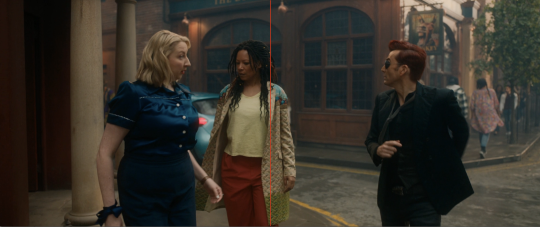

Well SURPRISE, idiots!
Forget everything you learned in film school because we're cutting immediately to a second medium length shot of the 3 characters from a slightly more camera-right perspective for no reason whatsoever, in the *opposite* direction of where the action is going, WHILE THAT ACTOR IS SPEAKING A LINE. This is so counterintuitive to the blocking of the scene that Maggie literally gets shoved out of frame while we're supposed to be reading her reaction to Crowley's dialogue.
I can't stress enough how weird it is on a fundamental level. When a camera is moving and a character is talking, conserving continuity of action is THE ONE thing you don't sacrifice. It pulls people out of the moment, and makes it extra obvious that multiple takes have been stitched together.
Which leads me to think that this is intentional, and sets up what I hinted to at the beginning of this whole "The More You Know" moment : Nina is the main character of the scene we're watching, until, suddenly, Crowley is.
If you separated those two moments before and after the cut and watch them as two different scenes, you can see the camera following Nina and keeping her center before, but directly following Crowley and keeping him center *after* the cut. We've switched narrators in this moment. And to top it all off, they're making it pretty obvious that, while Nina is listening and reacting to both Crowley and Maggie, Crowley does not give a rat's ass about the two humans (not either not really in frame, or cut off behind him).
#good omens 2#good omens meta#art director talks good omens#go season 2#go meta#good omens season 2#good omens season two#good omens#go2#good omens prime#crowley#anthony j crowley
644 notes
·
View notes
Text
Some thoughts on The Coffin of Andy and Leyley
I found out about The Coffin of Andy and Leyley from an ”antiship” blog that I was on solely to block, because these people are always violent callout culture transmisogynists. Them getting very upset about this game having incest in it piqued my interest. The art looked interesting, and if these people hate it, it can’t be all bad.
(Case in point about the transmisogyny, from my understanding some people tried to dox the pseudonymous and secretive developer of this game, Nemlei. And the motivation was to prove the doxxer’s suspicion that Nemlei is a trans woman, because “only a trans woman could create such degeneracy.”)
Sure enough, TCOAAL is actually a nuanced and well-written psychological dark comedy /horror game. This is going to be more of a preliminary analysis than a review so full spoilers beyond this point. It’s by necessity preliminary since the game isn’t finished yet. My review is: go buy it if you are a fellow sicko who enjoys interesting stories about cannibalism and incest and like visual novels.
TCOAAL uses a trick from more transgressive forms of horror fiction, where the protagonists are not the heroes, but the villains, and the story is from their perspective. Andrew and Ashley Graves are murderers who kill people, sacrifice their souls to demons and cannibalize their bodies. They would be the villains of a more conventional horror story, their crimes investigated and thwarted by some heroic detective perhaps. But in this type of story, you are denied the comfort of heroes, or even innocent victims as you watch the protagonists twisted psychology lead them to commit terrible deeds.
The tone of the story mostly isn’t really horror, but very dark comedy, kinda Jhonen Vasquez-ish. The horrors are portrayed with a gleeful flippant tone, and cute appealing art. The tone mirrors how especially Ashley feels about her crimes. The game’s tone gets serious sometimes, going for straight horror occasionally, acknowledging how heartbreaking yet insane the Graves situation is, but there is a deep vein of the blackest humor.
Andrew and Ashley
Andy and Leyley themselves have this co-dependent toxic abusive sibling dynamic. Ashley is emotionally abusive, extremely possessive and manipulative towards Andrew. But her beloved Andy is the only person she actually cares about, and the rest she is able to kill with gleeful abandon in her heart.
Yet Andrew is not purely a victim. I’m going to talk at length about him, because the gap between how he describes himself and what the game shows is fascinating. I’m not the first to point this out. And it even extends to the game’s promotional material, like this official art on the game’s steam page is actually subverted by the game itself.
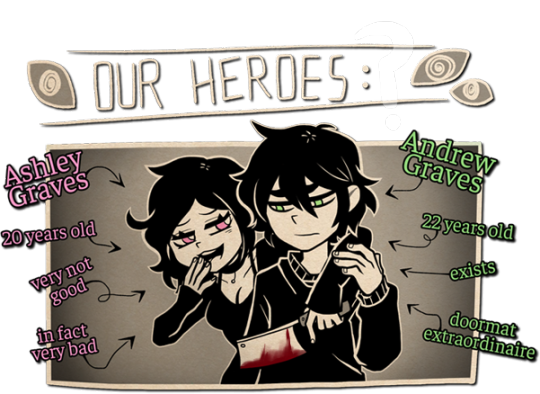
His character is not "doormat extraordinaire" who just "exists", the words "very not good, in fact very bad" apply to him too.
He is a victim, and loves to point at times how exploited, manipulated and abused he is by Ashley and he’s of course right. But he also uses that as an excuse for the horrific violence he commits, that he is just a doormat has been manipulated and corrupted by Ashley. “I was just being manipulated by Ashley to do it” is his variation on the old Nuremberg defense for his crimes. He has no sense of personal responsibility, no understanding that even if someone else tells you to do it, you are still responsible for your actions.
And the game itself proves that “it’s all Ashley” is not really true. A lot of the violence and murder are definitely on Andrew’s own initiative. He is violent towards Ashley too, the abuse is reciprocal. And he like Ashley doesn’t care much about other people. He gets distraught about killing people, but if you follow his dialogue, he is mostly freaked out about the consequences for himself. He is dependent on Ashley as someone who he can lay all the responsibility and blame for his own actions for. And of course, there is genuine affection there, because things are complex. He was parentified to take care of Ashley as a child and still has the drive to be her caretaker and protector.
It’s a fascinating pair of characters, and an interesting dynamic to observe.
“Der Mensch lebt nur von Missetat allein”
And the game’s writing is smart enough to have them not be an individualized evil, that came out of nowhere. Andrew and Ashley are the products of a neglectful and cold parents. Their mother made Andrew the favorite, but basically in order to parentize him to take care of his younger sister. And their dad can’t even remember the names of his kids. Not that the cycle of abuse starts with the parents, the mother had Andrew and Ashley when she was 15 and 17 respectively. But that doesn’t excuse how they ultimately, sell their kids’s lives for money to an organ harvesting scheme. This scheme is strongly implied to be part of an hilariously over-the-top soda company, toxisoda (it’s implied their soda is literally made from humans, so the company is doing the same thing that Ashley and Andy does, but on an industrial scale).
This is the situation that pushes Andy and Ashley to become evil murder-cannibals horror movie villains they become. They are deliberately being starved to death, and decide human meat is preferable to that. And the point here is obvious. To quote Brecht, “Erst kommt das Fressen, dann kommt die Moral” or in english translation “Food is the first thing. Morals follow on.” Andy and Ashley are bad people who kill and eat other people, but they are the product of an evil society. A family system where children are property of their parents to be abused and sold. And ultimately a capitalist system which kills people to feed others, a societal and systematic version of what Andew’s and Ashley does. They literally become cannibals to escape becoming literally or essentially cannibalized themselves by the capitalist system. Capitalism is a system which works on prey and predator dynamics, and they just fought to became predator instead of prey. To further quote the same song by Brecht, in capitalism, “Der Mensch lebt nur von Missetat allein” or in english “mankind is kept alive by bestial acts.” And in that broader view, Andrew and Ashley’s small-scale evil is dwarfed by the system they are born into.
Incest
It’s with all this context the game’s treatment of incest must be understood. It’s a horror game, about two siblings with a fucked-up abusive relationship. Of course there is incest, it’s far from being the worst thing these two do. The game only gets more explicit about incest in one optional ending, but it’s there explicitly and subtextually from the very start. Ashley jokes about it repeatedly, it’s there in the possessive jealousy Ashley feels for any of Andrew’s girlfriends, it’s implied in the casual physical intimacy of the siblings. Like it’s very obvious that their fucked-up but close relationship can lead there right from the beginning of episode 1. It’s a very natural conclusion to their dynamic. And the characters know it, Ashley definitely knows it, and their own mother accuses them of it. Andrew denies his mother’s accusation of fucking Ashley, and he’s probably not lying at that moment, but his relationship with Ashley leading there make perfect sense and he is not just capable of admitting that. Anyone who claims to have played this game and then claims be shocked that there is an optional incestous ending can’t have been paying much attention. This is the incest cannibalism game.
The Graves siblings are heading towards committing more murder as long as they stay alive, and incest is a minor sin for them. And probably not even the unhealthiest way for their relationship to develop. It definitely won’t fix them, but I doubt it will make things much worse.
And condemning the game morally is just absurd. This is a horror game, and you are outraged about the incest and not the murder-cannibalism? The Graves siblings relationship is not portrayed as healthy and the incest is part of that.
In fact the game portrays this double-standard in the actual story. It’s the possibility of her kids committing incest that finally makes Mamma Graves admit she is “the worst mother ever”, and not the whole selling the lives of her kids for money thing.
Sure, there is a fair argument to make that the incest is romanticized and fetishized. Ashley and Andrew are certainly drawn as attractive, and even the abusive elements can be part of the fetish. But the thing is, Ashley and Andrew are not real people, it’s fiction, it’s not real incest, so if people get off to it, I have no reason to see it as a problem.
The antiship blogger was actually especially angery about this official art from a devlog and honestly after playing the game, it kinda sums up my feelings about the incest controversy:

#the coffin of andy and leyley#my writings#gravescest#kinda#also i had much fun quoting brecht here#the coffin of andy and leyley spoilers
184 notes
·
View notes
Text
Reaching Your Wordcount Goal
Have you ever been in a situation where you just can’t seem to get a scene to fill much more than a page or two? Or you’re at 500 words when you want to be at 2500 and it feels impossible to get there? Here’s some common problems that may be holding you back:
1. Your pacing is too fast
Pacing is probably the number one controller of word count. If it’s too fast, amazing scenes that could take up 5000 words are going to be 500. I talk a lot more about controlling pacing here, but essentially, try to use your MCs senses and internal dialogue to create ‘space’ between physical events of the scene. In an action-packed scene that should fly by a little faster, cut these parts out and focus more on the physical action instead.
2. You aren’t utilizing the setting
Similar to pacing, you may be underutilizing the elements of the scene. Make sure you’re incorporating all of the senses—sight, sound, smell, taste if applicable, feeling. Even things such as the vibe or non-physical feeling of a place add something to the setting. Try to think of unique details that make a place more interesting—get specific!
3. You aren’t checking in with your MC
Memories, internal dialogue, ruminating and ideas are all things that bring us closer with the MCs and add to a scene. You can use these moments to develop their character, their dynamics with others, foreshadow or hint towards upcoming plot, or add or strengthen any other elements of the narrative. These check ins ultimately allow you to explore the unique perspective your MC has on a situation, and are a great opportunity for words!
4. Your scene went off a few lines back
Maybe it was a weird turn in dialogue or a missed opportunity, but sometimes just rewriting the scene and actively trying to take it in a different direction can dislodge something that’s sticking the gears. Don’t be afraid to write through different paths and options and find the one that works the best!
What are some ways you find makes a scene go easier?
#writing#writers#writing tips#writing advice#writing inspiration#creative writing#writing community#books#film#filmmaking#screenwriting#novel writing#fanfiction#writeblr#reaching your wordcount goal#goals#wordcount#wordcount goals
543 notes
·
View notes
Note
Do you have any advice on writing an actual book, that has no dialog?
Like I haven't started yet, and I don't know what I'm doing before hand, and I can't really find much.
Thanks for asking! Writing a book without dialogue can be a challenging endeavor, but it can also offer a lot of creative opportunities. Here are some tips to get you started:
Establish a strong narrative voice: Since you won't have dialogue to convey character personalities or interactions, your narrative voice becomes crucial. Develop a strong narrator who can guide readers through the story, offering insights, thoughts, and observations. Keep in mind that this will differ based on which perspective you're writing in (first person, second person, third person limited, or third person omniscient).
Focus on descriptive writing: Without dialogue, you'll rely heavily on descriptive prose to convey emotions, actions, and atmosphere. Use vivid imagery, sensory details, and evocative language to paint a rich picture of your story world.
Show, don't tell: This rule becomes even more important when writing without dialogue. Instead of telling readers what characters are feeling or thinking through dialogue, show it through their actions, body language, and internal reflections.
Create complex characters: While you won't have characters speaking directly to each other, you can still develop rich, complex characters through their actions, decisions, and internal conflicts. Give your characters depth by exploring their motivations, fears, and desires.
Use inner monologue: Since you won't have characters speaking their thoughts aloud, you can delve deep into their minds through inner monologue. Allow readers to see the inner workings of your characters' minds, their doubts, hopes, and fears.
Experiment with structure: Without dialogue to break up the text, you have the freedom to experiment with different narrative structures. You could use flashbacks, nonlinear storytelling, or multiple perspectives to enhance your story.
Focus on plot and pacing: With no dialogue to drive the story forward, you'll need to pay extra attention to your plot and pacing. Make sure each scene advances the story in a meaningful way and maintains the reader's interest.
Happy writing ❤
Previous | Next
#ask#writeblr#writing#writing tips#writing advice#writing help#writing resources#creative writing#deception-united
74 notes
·
View notes
Note
how are we feeling about this project amber update
assuming this is in relation to childe bc who the fuck else JWDJWJKDJKW anon im so sorry if not. also so so sorry for how out of hand this got. i am simply unwell about him.
But! Well. there certainly are thoughts
(obviously 4.6 datamine of arle SQ and her voicelines; This Will Not Spoil Anything Abt The Main SQ Plot, i only discuss the relevant parts. also some p Heavy negativity towards fanon ooc at the start youve been warned dont @ me)
(i mean i didnt even read anything of the SQ but The scene w childe so idek the main plot of the quest rly either lmao. tho go at ur own risk if u wanna check the dialogue out; its the 2nd quest log but it does hint at the greater story)
TLDR: how i feel abt his appearance in a vaccuum? quite solid despite the briefness, actually. accounting for the way fanon is 100% likely going to be reading into this and turning it into the Lets Infantilize Ajax Even More 2024 championship? conflicted.
in other words; a certified labyrinth warriors moment - theyve expanded on childes character in a very interesting and quite a compelling way and while i Do like the potential in what im seeing from hoyos end theyve also done it so that its going to be misinterpreted to hell and back by fanon so i kinda have an immediate jaded love-hate moment going on JJWJDKJDKJWJDWKJ
its literally just labyrinth warriors flashbacks - that event has some of my ALL TIME favorite insights into who ajax is and how he views the world and himself but when the event came out all everyone cared abt was to warp it into baby boy stuck in scawwy paper boy dungeon dehumanizes himself by calling himself a weapon and doesnt love himself he is such a sad trauma meowkitten 🥺🥺so yeah
bc like lets look at this properly for a bit; okay he went back to fontaine to look for skirk still somewhat injured and waa waa my 286 month infant baby cannot Make decisions like that!!!!!11! which is to say. i am tired of him getting this shit every time.
is it smart of him to get on the move immediately with just the bare minimum of rest? no. do i like that hes straining himself before proper recovery? not particularly no. do i feel the particular need to psychoanalyze this grown man and feared warrior whos 100% survived Way Worse in Way More Extreme Situations for it? hell fucking no.
while not at all the course of action a medical professional would approve of. from childes POV its perfectly logical hes priorizing going back for skirk when its literally the FIRST TIME shes showed up in like. a Decade. when hes been looking for her all this time are you kidding me 😭😭😭 but fanon must keep fanoning for their widdle baby girl so what does a hater like me know
anyway. seething and venting over im gonna try to avoid bringing up how much i hate this kinda infantilization of ajax now im sorry for bringing it up so much on ur innocent ask anon KJWDJKWKJDJDKWJKD. neutral discussion moment. i Promise
so it seems that theyre going for the pulcinella-is-shady-about-ajax (and prolly his family) angle for good and like. personally for me as long as the only real source of that claim was scara (a cynical edgelord who doesnt believe in non-exploitative human relationships, mind you) i was rather skeptical towards just instantly drawing that conclusion, but well. with the scene in arles AQ it appears to be sth theyre building towards
i actually really fucking loved that scene bc while theres outsider perspectives (scara obvi; and even arles line for him has that vibe. and ppl still take that shit face value 💀💀) and a lot of fandom assuming childes like. completely clueless and naive and ignorant towards the potential risks involved with trusting pulcinella. this is actually a very clever demonstration of quite the opposite? and showcasing how despite his aversion towards schemes and lies hes still intelligent and knows the kind of people hes dealing with when it comes to his fellow harbingers
like. childe has a negative opinion of arle based on what pulcinella has told him about her because at face value many of her deeds are in heavy conflict with his values of loyalty and family. and because he does not have the further context behind her actions and what the HotH under her is really like. Obviously hed hold a very hostile and wary view towards arlecchino
(ESPECIALLY when with all this biased intel hes still going to run into kids from the house!!! and then hes going wtf? these are good kids. what the hell is that knave doing with them??? blink twice if you need help i will start a civil war for yall like thats how he is with kids!!!!)
so YES. pulcinella has given him if not false then at least misleading intel based on the political tension between himself and arlecchino and the wider HotH. and childes taken that at face value! sure! he is close with pulcinella of course he would!
BUT. THEN. he returns to fontaine and seeks arlecchinos help looking for skirk. and observes her behavior and modus operandi for himself as well as the kids. does he go "nah she must be just hiding the crazy evil shit i would never distrust pulcinella" and leave it at that when reality doesnt completely match his expectations?
NO. because when offered the opportunity through the traveler asking about the HotH childe immediately capitalizes on the opportunity to prod for answers and see if pulcinella is lying to him!!!!
and hes so fucking smart with the way he does it too???? i LOVE his intelligence. the entire thing is so simple yet elegant; it Completely relies on his reputation as the kinda gullible harbinger whod Never scheme or hide Anything to indirectly affirm or deny his suspicions. he doesnt Need to Pretend to care about the possibility of arle betraying the kids bc he genuinely does!! and when she pushes back against the accusation he doesnt Need to fake admitting to her that well, actually, its all just rumors so he could be completely wrong. and so on. like he navigates the entire thing so effortlessly. and whats the end result?
childe has Confirmation of pulcinellas possible ulterior motives in action AND that arlecchino is a much more reliable ally than he initially assumed. all the while appearing as just The Straightforward 11th. like obviously id need to hear it voiced first to be sure but in text it v much gives the impression hes almost kinda just. playing up the threats towards arle and being "dumb" on Purpose?? to get the answers he wanted out of arle without appearing like hes fishing for anything particular. and i just hhhhhhhhhhh
i love when he does this so muchhhh!!!!!! 😭😭 he doesnt need to become some machiavellian schemer to be able to strategize !!!!!! he avoids scheming bc he Dislikes it not bc hes incapable of it like this has Always been the case Since Liyue AQ and i love whenever they show that side of himm . my Beloved
so anyway. while i do still think the like "pulcinella is bad and has his family hostage" is still kind of a generic plotline and i hope the writing regarding the whole thing wont ultimately turn out to be sth That simplified and black and white. its p clear theyre doing Something with pulcinellas motivations and as they are. im Really glad theyre letting it show that childes not just some completely passive party being manipulated in this all. he Is thinking abt this stuff and his position among the harbingers. ig we shall see where it goes - not the greatest fan of the concept still, but canon text supports it becoming a thing way more than when it was just scaras word we had for it. hope theyll surprise me positively w how they go about it!
then briefly for the rest uhh
also loved arle and childe just shittalking the rest of the harbingers it was amazing. i wasnt expecting this kinda dynamic between them at all but its great lmao. also i wanna see childe hang out w the HotH kids
as for project stuzha; so we dont really get anything solid on it other than being summoned back to snezhnaya for it is apparently a Big Deal. but still very interested. let my man have his endgame significance Trust
childes appearance was obviously v brief ultimately but that was clear from his leaked linecount to begin with - i am pretty satisfied with what they seem to have done w him. like its not The Best but also i wasnt expecting his lore to get some massive expansion in another harbingers SQ . the worst i feared was that it was just going to be a flashback of arle returning his vision which did Not happen so massive W. i am super hyped to hear this scene voice acted proper and happy to see him again, i really hope he gets to appear at least once more in an interlude or dains quest or something before going on hiatus again but idk if thats too much to ask LKKWJDJWDJWD
also: i am never changing my namecard after this patch drops. oh my godddddddd its So Fucking Beautiful 😭😭😭😭
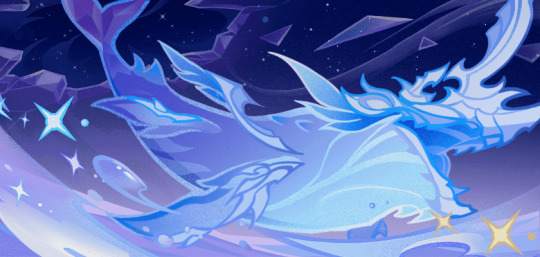
But. Yeah. lots of good stuff. unfortunately lots of it will get misinterpreted and fanon will get obnoxious about it. but i still love getting to see him again and i am speedrunning that namecard day fucking one mutuals and/or followers in EU please add me (UID 711090267) ill need coop buddies for the world bosses
thank youuuuuuu for the ask i hope this monstrosity of a monologue doesnt scare u off 💀💀💀
#im actually so sorry for dumping this on you anon i Really hope this was what you were referring to bc . if not then JJWDJKADJKDW#ill feel horrible 😭😭😭😭 but also. this is the brand i have no clue What Else would it be#i Guess it could be about arlecchino as a whole ? im sorry anon i didnt actually read the entire SQ log so idk yet how it all goes#but sure ask me abt my arle thoughts if ud like after this jumpscare once the patch has gone live jjkjkdjkwjkjkdw#also 286 months is 23 years 10 months. no i dont have an age hc for him set in stone or anything but eh . its in the ballpark#asks#aaaand unsurprisingly this goes into#childeposting#genshin
68 notes
·
View notes
Text
Writing TCF fanfic is truly an experience because Kim Roksoo is such a character to write.
Like , something abt him is so difficult to truly capture for me. Kim Roksoo as a character is so complex and his thinking kinda outlines his personality if that makes sense? If any internal dialogue is wrong or unnatural, it just won’t be Kim Roksoo.
Kim Roksoo is what makes TCF the story it is. His perspective, his internal dialog, everything about him bleeds into the story of the other characters since he’s the guy we see everything through.
He drops these really important pieces of information so casually that I don’t even notice it until chapters later. I really want to be able to capture that kind of attitude he has. He’s so care free but he cares a lot at the same time, KRS the man that you are….
And also, OG!Cale 😭😭 ohhh I’m struggling so much, we have a grand total of what, four chapters with him in it? Those chapters tell us a decent amount about his personality, and we learn some hints about other things from KRS early on in the novel, but this guy is so mysterious.
He’s clearly smart and calculative, but his actions differ from Kim Roksoo’s. They are similar, but not the same. It’d be so interesting if these two kinda mirror each-other. Their ways of thinking are heavily impacted by the different lives they’ve lead, but at the same time it’s not all that different.
OG!Cale, please come back, I want to learn more about you. I really want to read more about Earth One, OG!Cale who now lives as Kim Roksoo, and his life and story.
#rambling#fanfic is such an experience#I love writing fanfic through the lense of a character analysis#but also I’m kinda struggling#but it’s okay#because it will be okay#trust#tcf#trash of the count's family#lout of the count’s family
55 notes
·
View notes
Text
I think what’s interesting about Neku as a protag is that while I’ve seen some people talk about how he’s one of the deeper/most complex characters in the franchise, I’d argue that he’s actually one of the most straightforward characters in the TWEWY duology-and I don’t think that’s a bad thing. That’s not to suggest that he doesn’t have depth, far from it. His trauma and the way that he goes about in trying to dissociate from others while still genuinely loving them deep down, even if he says otherwise, is genuinely interesting to see in action, especially in how he approaches his relationships. But compared to the others, I don’t find him as fascinating to explore in comparison to, say, Shoka, Joshua, Sho, Kanon, Motoi, Shiba, Mr. H, or even Rindo as a protag, even if his reappearance in NEO as well as how he tries to keep his trauma/emotions under wraps is still interesting to see in action.

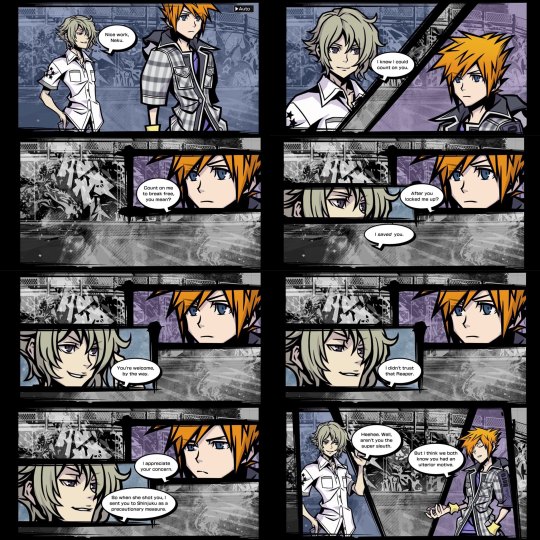
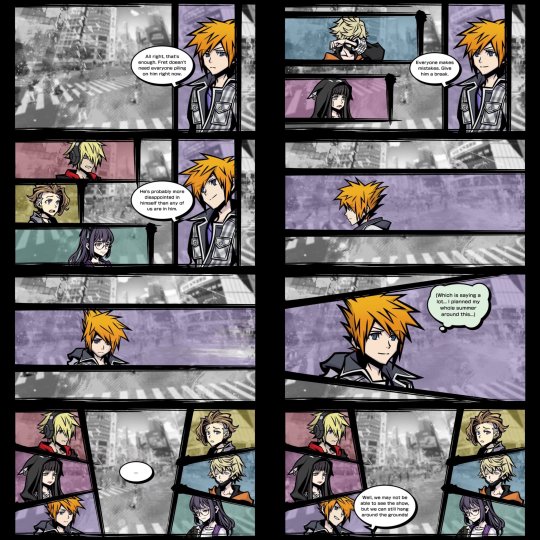
That said, he’s still one of my faves for how much he embodies TWEWY’s themes in general, his development just being great to see in action, and the impact he has on the people around him in various ways. In a series where a lot of the characters like to hide parts about themselves and how those affect the relationships around them, Neku in the first game is blunt to a tee, almost to a fault, and confrontational, which makes him the perfect receptacle for the themes/lessons the game imparts on him. We're privy to almost every single one of his thoughts, feelings, and emotions throughout the game, to the point that it almost becomes a first-person narration at times. He hates lying and it shows because when the characters have doubts about themselves, he’s the perfect guy for the job of setting them straight instead of trying to dart around the issue, getting them to look at themselves and try to press forward anyway.

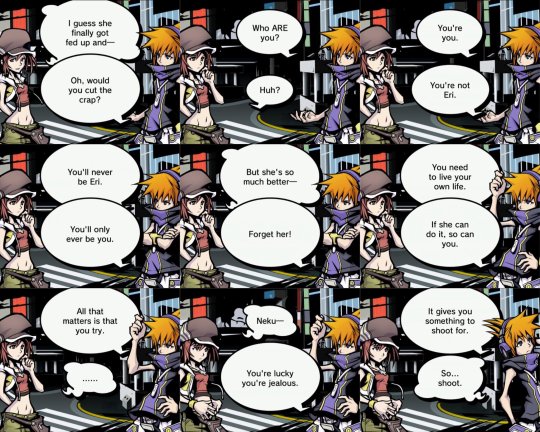

This is also part of what makes Rindo such an effective foil to him as a protagonist. Like I said in another post, while Rindo SEEMS more socially well-adjusted compared to Neku on a surface-level, once you look into his actions and mindset, you can see that he's also quite the dysfunctional mess. Whereas Neku is blunt, brutally honest, and incredibly confrontational, Rindo is much more passive, self-contradictory, and incredibly insecure about himself and the people around him, which feeds into how he puts people at arm's length, including his supposed best friend. The kid can't even tackle a simple-ass puzzle without needing to consult his online friend first or ask them about their identity because he's afraid of rocking the boat. Whereas Neku is alone AWAY from the crowd, Rindo is alone IN the crowd.

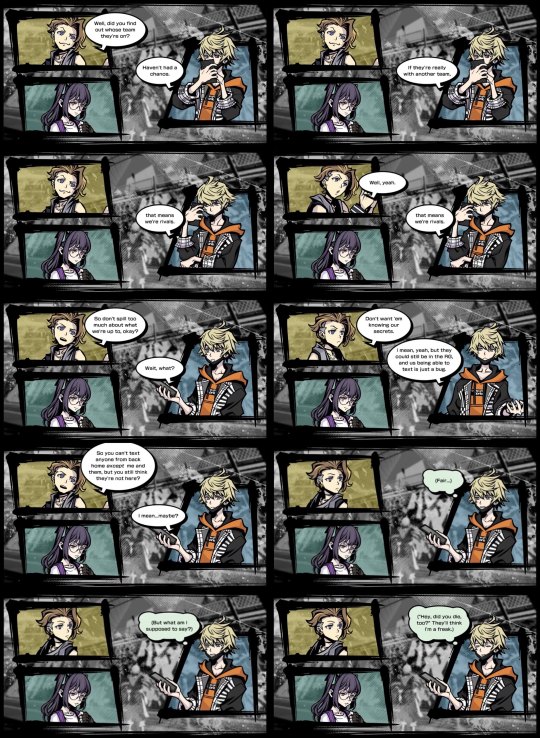
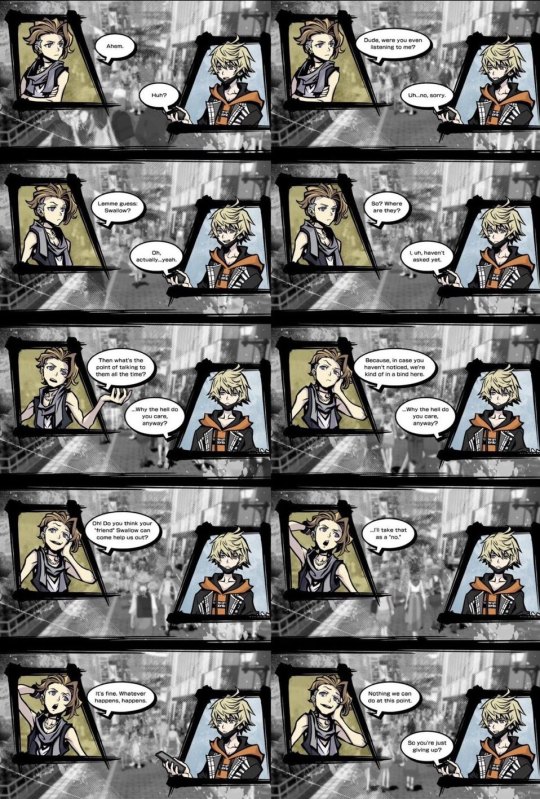
This also extends to their inner thoughts, where Neku will let us, the player, view into his mind and have him lay out exactly what he's feeling, the conclusions he comes to, and be confident enough in what he's feeling to then express himself in exactly that manner (with some exceptions such as some of his interactions with Joshua, which is justified because he doesn't want to risk anything happening to Shiki if their partnership goes south so he tries to keep what he says in check, even if it internally kills him inside, and even then he still spills out how PISSED he is with Joshua towards the end.)


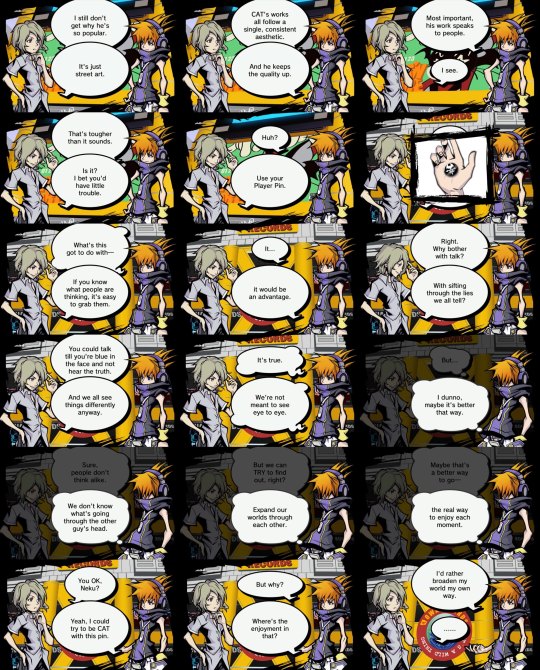
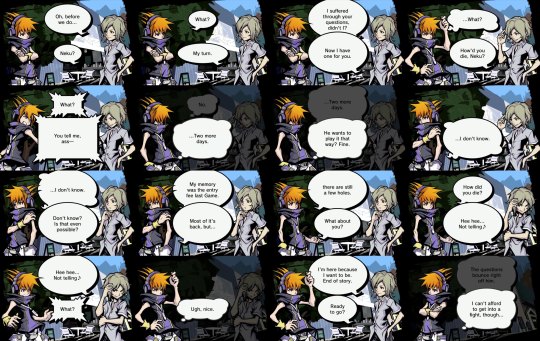
Meanwhile, in NEO, while we do play as Rindo and get the majority of the story through his perspective, we don’t get to see his inner thoughts/turmoil as much as Neku’s…because he DOESN’T want to recognize his issues, instead trying to rely on everyone else to solve his problems for him so that they can take the fallout in case something goes wrong and a lot of it shows through his actions/outspoken dialogue instead. Nagi’s Dive and Haz’s conversation with him are some of the only times someone directly calls him out on his flaws within the main story but when you pay attention to how he acts, his flaws pop up quite a bit. For example, how he claims that An0ther's quote of "never miss your chance to make a friend" is one of his favorite quotes yet he balks at the idea of recruiting other potential team members as well as grimace at the concept of the first game's Reaper's Game.
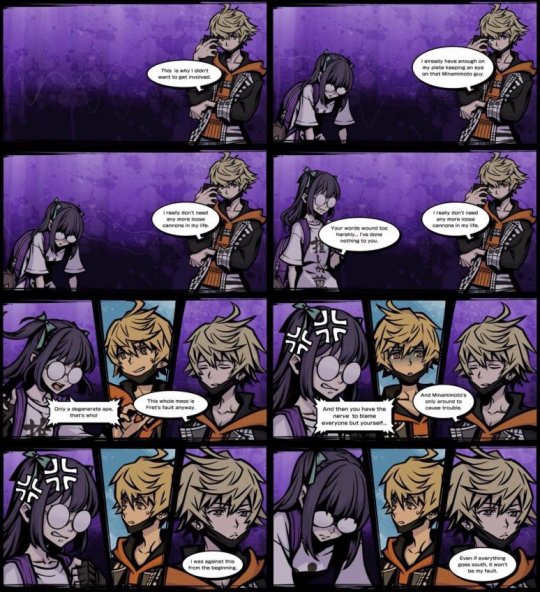
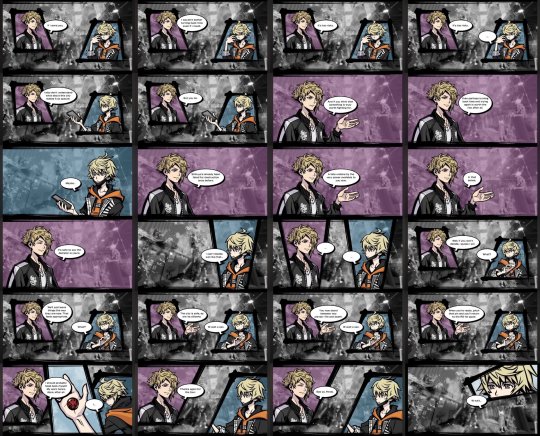
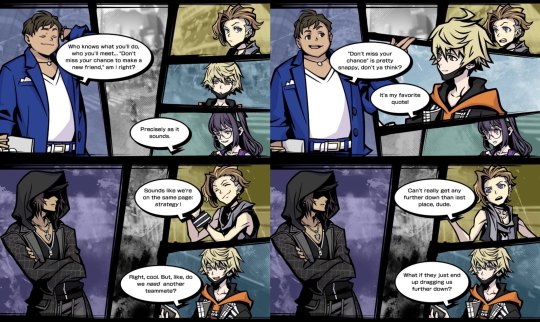

So we have a guy who’s constantly internally struggling with himself while putting on a cold/blunt persona because he doesn’t want to get hurt and recognizing that maybe he’s wrong on a point and letting us in on how he's feeling a vast majority of the time in his head versus a guy who constantly bitches and moans internally while passively going along with everything in spite of himself, constantly self-contradicting/being hypocritical without recognizing himself as such until he gets a much needed wake-up call later and I think that’s really interesting.
#the world ends with you#twewy#neo twewy#ntwewy#neku sakuraba#rindo kanade#analysis post#character analysis
54 notes
·
View notes
Text
Everything You Need To Know Before Editing Your Manuscript
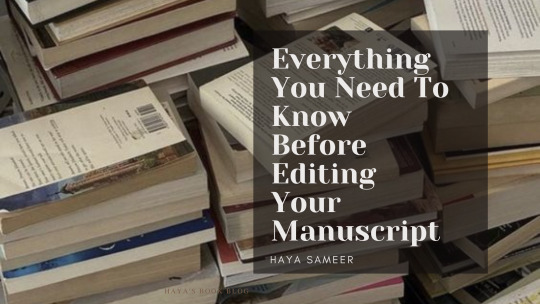
Finishing your manuscript is a big accomplishment, but that’s only the start of your writing journey. Now that you have a manuscript to work with it’s time to start your editing process and perfect your story. Editing might sound easy enough, but it involves a lot more than just correcting your SPAG.
If you’re a new author unsure about how to start editing your manuscript, here’s everything you need to know, from a self-published author.
Self-Editing: The First Step
Editing your own work can be both challenging and rewarding. When you take on the role of a self-editor, you gain a deeper understanding of your writing and the opportunity to refine it to its fullest potential. Self-editing helps ensure you cut down on noticeable mistakes before sending it out to an actual editor so that you can receive more productive feedback.
I would honestly hate having to pay someone just for them to tell me ‘you misspelt xyz’ which is something I could have caught with a quick read-through. Once you’ve finished your manuscript here’s how you can start off with some self-editing:
1. Take a Break Before You Start
After completing your initial draft, it's crucial to distance yourself from your work. Give it some time to breathe. This break can be a few days or even weeks, depending on your schedule. When you return to your manuscript, you'll approach it with a fresh perspective.
2. Read Your Manuscript Aloud
One of the most effective self-editing techniques is reading your work aloud. This process helps you identify awkward sentences, pacing issues, and grammatical errors that might go unnoticed when reading silently. It also allows you to hear the flow of your writing and the nuances of your character's voices.
3. Focus on SPAG (Spelling, Punctuation, and Grammar)
Before delving into more complex edits, address SPAG issues. Look out for common mistakes such as typos, subject-verb agreement errors, and misused punctuation. Utilize grammar and spell-check tools, but don't rely solely on them.
4. Assess Overall Structure and Flow
Consider the broader structure of your manuscript. Does the plot progression make sense? Are there any plot holes or inconsistencies? Verify that your story flows smoothly from beginning to end. Ensure that transitions between scenes and chapters are seamless.
5. Dive into Character Development
Characters are the heart of your story. Analyze each character's arc, motivations, and growth throughout the narrative. Ensure that their actions and dialogue are consistent with their personalities and the story's themes.
6. Refine Your Writing Style
Pay attention to your writing style and voice. Is it consistent throughout the manuscript? Make sure your unique voice shines through, and refine your prose to eliminate unnecessary repetition or verbosity.
7. Trim Excessively Long Sentences
Long, convoluted sentences can confuse readers and disrupt the flow of your narrative. Identify and break down lengthy sentences into more manageable segments.
8. Seek Feedback
Consider sharing your work with beta readers or critique partners at this stage. Fresh perspectives can uncover blind spots and provide valuable insights for improvement.
Remember that self-editing is an iterative process. After completing these initial rounds of edits, repeat the process as necessary until you're satisfied with the manuscript's quality
Types of Editing
When editing their manuscript authors often direct their focus to the way things are written and then call it a day. However, SPAG corrections are only the start of your editing process. Unsure of other ways to better your manuscript? Here are some types of editing I think every author should consider when self-editing:
SPAG Editing (Spelling, Punctuation, and Grammar)
SPAG editing, often considered the foundation of all editing, involves meticulously combing through your manuscript to correct spelling, punctuation, and grammatical errors. This stage is essential for ensuring the clarity and professionalism of your writing.
Tips for Effective SPAG Editing
Use Spell-Checkers Wisely: While spell-check tools can catch many errors, they're not foolproof. Pay close attention to context; for instance, "their" and "there" are both valid words but have distinct meanings.
Proofread Carefully: Rely on your eyes and proofread your work systematically. Reading backward, from the end to the beginning, can help you catch spelling errors.
Punctuation Matters: Proper punctuation enhances clarity. Study punctuation rules, including the use of commas, semicolons, and quotation marks.
Avoid Homophone Confusion: Homophones, such as "your" and "you're" or "its" and "it's," can trip up even experienced writers. Double-check these tricky pairs.
Consistency is Key: Be consistent in your use of tense, style, and formatting throughout your manuscript.
Consider a Style Guide: Depending on your project, adhere to a specific style guide like AP Style, Chicago Manual of Style, or your publisher's guidelines.
Line Editing
Line editing is where the magic of storytelling truly begins to shine. This stage of editing goes beyond correcting surface-level errors and focuses on enhancing the overall writing style, clarity, and impact of your prose.
Tips for Effective Line Editing
Sentence Structure: Evaluate sentence length and structure. Vary sentence lengths to maintain reader interest. Look for run-on sentences and fragments.
Word Choice: Opt for strong, precise verbs and nouns. Eliminate unnecessary adverbs and adjectives. Avoid clichés and overused expressions.
Consistency in Tone: Ensure the tone of your writing remains consistent throughout the manuscript. Be aware of shifts in tone that may disrupt the reader's experience.
Show, Don't Tell: Replace telling phrases with descriptive scenes and actions to immerse readers in your story. For example, instead of saying "She was nervous," show her trembling hands or racing heart.
Dialogue Polishing: Make sure your characters' dialogue sounds authentic and serves the story. Remove redundancies and refine conversations to convey subtext effectively.
Eliminate Repetition: Identify and eliminate unnecessary repetition, both within sentences and across paragraphs.
Read for Rhythm: Pay attention to the rhythm of your writing. Read your sentences aloud to ensure they flow smoothly and have a pleasing cadence.
Example: Line Editing in Action
Before: "He walked slowly into the dark room, and it was filled with an eerie silence."
After Line Editing: "He tiptoed into the dark room, which echoed with an eerie silence."
Line editing transforms a plain sentence into a more evocative and engaging one.
Plot and Structure Editing
Plot and structure editing is where the big picture of your manuscript comes into focus. It involves assessing the overall narrative flow, character arcs, and thematic coherence of your story. This stage ensures that your readers will be captivated by your tale from beginning to end.
Tips for Effective Plot and Structure Editing
Plot Evaluation: Review your plot to identify any inconsistencies, gaps, or unresolved subplots. Ensure that your story has a clear and engaging trajectory.
Character Arcs: Analyze the development of your characters. Verify that they experience growth, change, or transformation throughout the story. Characters should face challenges and evolve as a result.
Pacing: Assess the pacing of your narrative. Balance action scenes with moments of reflection. Avoid overly slow or rushed sections that may disengage readers.
Transitions: Ensure smooth transitions between scenes and chapters. Use transitional elements like hooks, cliffhangers, or thematic connections to maintain reader interest.
Foreshadowing: Check for effective foreshadowing to create anticipation and intrigue. Ensure that events and revelations are set up in advance to make them more satisfying for readers.
Climax and Resolution: The climax should deliver on the story's promises and conflicts. The resolution should tie up loose ends while leaving room for reader interpretation.
Character Development Editing
Character development editing is the key to creating characters that readers will connect with, empathize with, and remember long after they've finished your book. This type of editing focuses on making your characters three-dimensional and integral to your story.
Tips for Effective Character Development Editing
Character Profiles: Create detailed character profiles that include physical attributes, personality traits, backgrounds, motivations, and flaws. Refer to these profiles as you edit to ensure consistency.
Character Arcs: Analyze each character's journey throughout the story. Ensure that they experience growth, change, or development in response to the plot's events.
Dialogue Authenticity: Pay attention to character dialogue. Each character should have a distinct voice and speaking style that aligns with their personality.
Internal Conflict: Explore each character's internal conflicts, desires, and fears. These internal struggles add depth to their characterization.
External Conflict: Consider how characters interact with one another and their external conflicts. Ensure that their actions and decisions are in line with their personalities.
Consistency: Maintain consistency in character behavior, beliefs, and values throughout the story. Avoid abrupt character shifts unless they are well-motivated and explained.
Style and Voice Editing
Style and voice editing is the stage where your writing truly becomes distinctive and memorable. It involves refining your unique writing style and ensuring that your narrative voice shines through consistently.
Tips for Effective Style and Voice Editing
Identify Your Writing Style: Reflect on your writing style. Are you descriptive and poetic, or concise and direct? Understand your natural tendencies.
Consistency is Key: Ensure that your writing style remains consistent throughout the manuscript. Abrupt shifts in style can be jarring to readers.
Narrative Voice: Identify your narrative voice. Is it first-person, third-person limited, or omniscient? Make sure your chosen narrative perspective aligns with the story's needs.
Character Voices: Pay attention to the unique voices of your characters. Each character should have a distinct way of speaking and thinking, contributing to the overall narrative texture.
Finding a Professional Editor
Writing a book is a deeply personal journey, but when it comes to the final steps of polishing your manuscript, it's essential to bring in a fresh perspective. This is where a professional editor comes in. They can help transform your work from good to outstanding, ensuring that it's ready to captivate readers. In this section, we'll explore how to find the right editor for your project.
When to Consider Hiring a Professional Editor
While self-editing and feedback from beta readers and critique partners are valuable, there comes a point when seeking professional editing assistance is crucial. Here are some key indicators that it's time to hire a professional editor:
After Self-Editing: Once you've gone through multiple rounds of self-editing and received feedback from beta readers, it's time to consider professional editing. You've taken your manuscript as far as you can on your own.
Before Publishing: Professional editing is essential if you plan to publish your work, whether traditionally or through self-publishing. It ensures your manuscript is in top shape, ready to impress agents, publishers, or readers.
For Complex Projects: If your project is particularly complex or requires specialized knowledge (e.g., technical writing, academic papers, historical accuracy), a professional editor with expertise in that area may be necessary.
Types of Professional Editing Services
Professional editors offer various types of editing services, each addressing different aspects of your manuscript. Here's an overview of the most common types:
Developmental Editing: This type of editing focuses on the big picture. Developmental editors help you shape your story, refine your characters, and ensure your plot flows smoothly.
Line Editing: Line editors dive into the nuances of your writing. They focus on improving sentence structure, style, and narrative flow, making your prose shine.
Copyediting: Copyeditors are meticulous about grammar, spelling, punctuation, and consistency in style and formatting. They ensure your manuscript is error-free and conforms to industry standards.
Proofreading: The final stage of editing, proofreading checks for typos, formatting errors, and minor issues that may have been missed in earlier rounds of editing.
How to Choose the Right Editor
Finding the right professional editor is a crucial step in your publishing journey. Here's how to make the best choice:
Research: Look for editors with experience in your genre. Explore their portfolios and read client testimonials. A track record of successful projects is a good sign.
Sample Edit: Many editors offer a sample edit or consultation. Use this opportunity to assess their compatibility with your manuscript. Check if their editing style aligns with your vision.
Communication: Clear and effective communication with your editor is paramount. They should understand your manuscript's genre, themes, and your specific goals for the project.
Budget: Get quotes from multiple editors and consider your budget. Editing can be an investment, but it's essential to find a balance between quality and cost.
Contracts: Before starting the editing process, sign a clear contract that outlines the scope of work, deadlines, fees, and any additional services. A well-defined agreement protects both you and the editor.
Choosing the right professional editor is a partnership that can significantly impact the quality of your manuscript. Take your time, do your research, and find someone who truly understands your work.
Editing Tools and Software
In the digital age, writers have access to a wealth of editing tools and software that can significantly simplify the editing process. These tools not only help catch grammar and spelling errors but also provide valuable insights into your writing style.
1. Grammarly
Grammarly is a widely recognized and user-friendly tool that checks your writing for spelling, grammar, punctuation, and style errors. It provides real-time suggestions as you write in various platforms, including web browsers, Microsoft Word, and Google Docs. Grammarly's premium version offers more advanced features like style improvements and plagiarism checks.
2. ProWritingAid
ProWritingAid is an all-in-one writing assistant that goes beyond simple grammar checks. It offers in-depth reports on readability, overused words, style issues, and more. The tool integrates with popular word processors and even has a Scrivener plugin for authors who use this writing software.
3. Hemingway Editor
Named after the renowned writer Ernest Hemingway, this tool helps you simplify your writing. Hemingway Editor highlights complex sentences, common writing errors, and suggests alternatives to improve readability. It's particularly useful for authors aiming for clear and concise prose.
4. Scrivener
Scrivener is a comprehensive writing and editing software designed for authors. It provides a flexible workspace to organize your manuscript, research materials, and notes. While Scrivener isn't an editing tool in the traditional sense, its robust features can streamline your editing process.
5. Google Docs
Google Docs is a versatile cloud-based platform for collaborative writing and editing. It offers real-time collaboration, commenting, and revision history tracking. Authors can easily share their work with beta readers, critique partners, or professional editors.
6. AutoCrit
AutoCrit specializes in helping authors improve their fiction writing. It analyzes your manuscript for issues like pacing, dialogue, and repetition. It provides recommendations to enhance your storytelling and writing style.
7. Hemingway App
Similar to Hemingway Editor, the Hemingway App identifies complex sentences, adverbs, and passive voice in your writing. It offers immediate feedback to help you simplify and clarify your prose.
8. Evernote
Evernote is a powerful note-taking and organizational tool. While not an editing tool per se, it's indispensable for keeping track of ideas, research, and notes during the writing and editing process.
9. Reedsy Book Editor
Reedsy Book Editor is an online tool that helps authors format their manuscripts for publishing. It's especially handy for self-publishing authors looking to create professional-looking ebooks.
Common Editing Mistakes to Avoid
Editing is a critical step in the writing process, but it's essential to be aware of common editing mistakes that can hinder your progress. By recognizing and addressing these errors, you can refine your editing process and elevate the quality of your manuscript. Let's explore some of the most prevalent editing pitfalls and how to avoid them.
1. Editing Too Soon
One of the most common mistakes writers make is editing their work too soon after finishing the first draft. While the enthusiasm to refine your manuscript is commendable, it's crucial to give your writing some distance. Take a break before diving into the editing process. This allows you to return to your work with fresh eyes and a more critical perspective.
2. Neglecting the Big Picture
Focusing solely on grammar and spelling (SPAG editing) during your initial editing rounds is a mistake. While these aspects are vital, it's equally important to assess the overall structure, plot, character development, and style of your manuscript. Neglecting the big picture can result in a polished but fundamentally flawed story.
3. Overediting
Yes, you read that right—overediting can be a problem. Constantly revising your manuscript without a clear plan can lead to a never-ending editing cycle. Strive for a balance between thorough editing and knowing when your work is ready to be shared or submitted.
4. Ignoring Feedback
If you've enlisted beta readers or critique partners, their feedback is invaluable. However, it's a mistake to ignore or dismiss their insights. Be open to constructive criticism and use it to refine your work. Remember that not every suggestion needs to be implemented, but each one should be considered thoughtfully.
5. Relying Solely on Editing Software
While editing tools and software are powerful aids, they are not infallible. Relying solely on automated editing tools without human oversight can result in errors going unnoticed. Always use these tools as supplements to your own editing process, not replacements.
6. Rushing the Final Proofread
Proofreading is the last line of defense before publishing. Rushing this step can lead to embarrassing typos and errors slipping through. Take your time to meticulously proofread your work or consider hiring a professional proofreader for the final polish.
7. Neglecting Style Consistency
Consistency in style, tone, and formatting is vital, especially in longer works. Neglecting these aspects can create a disjointed reading experience. Create a style guide or checklist to maintain consistency throughout your manuscript.
8. Dismissing Your Gut Feeling
Sometimes, you might receive feedback or advice that conflicts with your vision for your manuscript. While it's essential to be open to suggestions, don't dismiss your gut feeling entirely. Ultimately, it's your story, and your voice should shine through.
9. Not Celebrating Progress
Finally, don't forget to celebrate your editing milestones. Writing and editing can be long and challenging processes. Take moments to acknowledge your accomplishments and keep the motivation flowing.
Beta Readers and Critique Partners
I want to finally end this blog post by talking about beta readers and critique partners. While some people might argue they shouldn’t be mentioned in an editing blog I think it’s important to also include them.
As an author, it's easy to become deeply immersed in your work, making it challenging to spot its flaws and areas for improvement. This is where beta readers and critique partners come in—a fresh set of eyes and perspectives to help you refine your manuscript.
Why Beta Readers and Critique Partners Matter
Objective Feedback: Beta readers and critique partners offer an objective viewpoint on your work. They can identify issues you might have missed due to your familiarity with the story.
Diverse Insights: Different readers bring unique experiences and preferences to your manuscript. This diversity of perspectives can highlight both strengths and weaknesses in your writing.
Identifying Weaknesses: Beta readers and critique partners can pinpoint areas that might not be immediately apparent to you. Whether it's character inconsistencies, plot holes, or pacing issues, their feedback is invaluable.
Tips for Working with Beta Readers and Critique Partners
Select the Right Readers: Choose beta readers or critique partners who have an interest in your genre and can provide constructive feedback. A mix of avid readers and writers can offer diverse insights.
Clear Guidelines: Provide clear guidelines or questions for your readers to focus on while reading your manuscript. This can help you receive specific and actionable feedback tailored to your needs.
Consider Diversity: Seek feedback from a diverse group of readers to get a range of perspectives and opinions. Different backgrounds and tastes can lead to well-rounded feedback.
Be Open to Criticism: Be prepared to receive both positive and negative feedback. Constructive criticism is essential for growth, and it's a sign that your beta readers care about helping you improve.
Take Your Time: Don't rush the feedback process. Give your readers ample time to read and provide their insights. Rushing can lead to incomplete or superficial feedback.
Ask for Specifics: Encourage your beta readers or critique partners to provide examples and specifics in their feedback. This makes it easier for you to understand and address their suggestions.
I hope this blog on Everything You Need To Know Before Editing Your Manuscript will help you in your writing journey. Be sure to comment any tips of your own to help your fellow authors prosper, and follow my blog for new blog updates every Monday and Thursday.
Looking For More Writing Tips And Tricks?
Are you an author looking for writing tips and tricks to better your manuscript? Or do you want to learn about how to get a literary agent, get published and properly market your book? Consider checking out the rest of Haya’s book blog where I post writing and publishing tips for authors every Monday and Thursday! And don’t forget to head over to my TikTok and Instagram profiles @hayatheauthor to learn more about my WIP and writing journey!
#hayatheauthor#haya's book blog#haya blogs#writers on tumblr#writer community#writer tools#writer blog#writer stuff#writer wednesday#writer tips#creative writing#writers of tumblr#writerscommunity#writeblr#writing community#writer spotlight#writer things#writing prompt#writing tools#writing stuff#writing#writing life#writing inspo#writing help#writing advice#writing inspiration#writing ideas#writing things#writing tip
106 notes
·
View notes
Photo
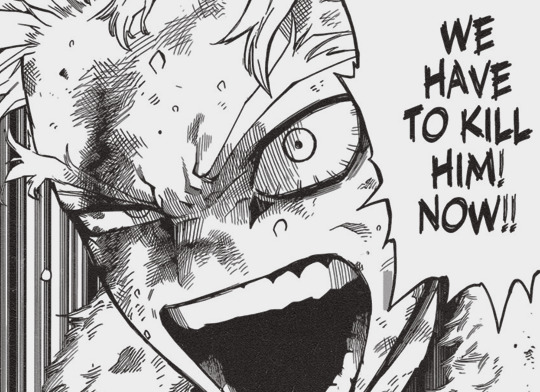
My Hero Academia, Chapter 374 Thoughts.
Why did the tide turn in the battle, just when Deku was about to finish off a ShigAfo who was well past his limit. Well, it was because Spinner managed to wake up Kurogiri, therefore teleporting all of the villains to the same battlefield sabotaging the hero’s strategy to keep them separate and finish them off individually. However, there are deeper thematic reasons beyond just the strategic aspects of the battle. The villains triumph when the heroes refuse to fix or face their mistakes, so how appropriate the last page of the chapter is Dabi and Twice facing two heroes who don’t want to own up to their mistakes?
1. Endeavor and Hawks.
There is a lot that can be said about Endeavor and Hawks, but I think for the sake of directness rather than delving into their backstory and motivations, it’s more appropriate to focus in on why they haven’t changed.
Before I being though let me explain personal narrative. Narrative is well.. you know... a story. It is how a series of events are told. There are different kinds of ways narrative are written up, for example first person is told as a limited personal account from a single narrator using “I”. In third person the perspective is told from outside of the characters. There are even differences in third person, third person limited can still be told in one character’s limited perspective so they are not privvy to the thoughts and motivations of another character, whereas third person omniscient can randomly jump around into anyone’s heads.
All of this to say is that narrative is telling a story, so one step ahead personal narrative would be like a first person narrative, or a third person limited... it is the story as told in the character’s own head. Oftentimes however, this personal narrative they have will be different from the objective events that are happening in the story.
There’s one thing you should always remember when reading a story, “Characters are liars.” There is text, which is the things either they through internal or external dialogue, or the narrative through prose blatantly say and then there is subtext the underlying theme or implications and you have to consider both when reading.
In other words, Endeavor and Hawks are liars. The internal monologues inside their own heads, often disagree with the reality of their actions. Many times viewers have commented they seem out of touch with the reality around them and this is caused by them being so wrapped up in their personal narratives they can’t see what is happening around them. ANd in doing so, they ignore the feelings of the people around them. I think AFO, as awful as he is, makes some good points sometimes.


I’ve said as much in previous metas, but the heroes as a whole tend to dismiss or even outright ignore the feelings of the villains they are facing, even when villains make honest attempts to communciate why they are doing what they’re doing. When AFO is making that speech, who shows up but Dabi and Twice, the two people that Endeavor and Hawks ignored the personal feelings of.
Toya, was created by the Todoroki Family at the behest of Endeavor ignoring his feelings until they exploded out of him accidentally starting a fire and burning him to death, Twice’s return was facilitated by Hawks coldly stabbing him in the back because Twice did not accept his offer to betray his friends for a chance at rehabilitation. Something which also trampled all over Twice’s personal feelings of affection and desire to protect his loved ones, by asking him to do something he would never do.
Hawks and Enji also have character arcs that have basically ground to a halt, ever since the first War Arc. Hawks reaction this chapter is pretty much proof of this, when he is faced with his failure to help rehabilitate Hawks his only reaction is “Just kill him again” which is exactly what he had done in the war arc. This is what I mean by character stagnation, characters refusing to grow or learn over time and instead making the same decisions over and over.
In Enji’s case the reason is much clearer, because we spend more time in his head than we do Hawks. It is a common criticism that has been levvied against Enji’s “redemption” since the start. Enji’s redemption really isn’t about doing what is best for the feelings of his victims, but rather Enji is always focused on himself, he doesn’t want to be a better father, he wants to be a better hero. He doesn’t want to help ease the pain of his victims, but rather the guilt he feels over it. Nowhere is this best exampled then his own internal monologue. Enji has a single moment where he might have let things be about his sons and not him for once.

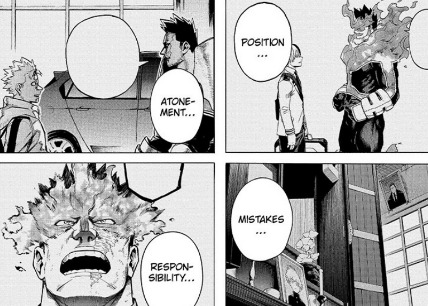
But, then it immediately centers on himself. For the most part, Enji seems to truly be upset not about the people he hurt, but rather he’s lamenting the fact his life has gone so wrong that he has to feel guilt in the first place. I think this is central to Enji’s stagnation and the lack of overall progress in Enji’s arc, he still doesn’t really think he did anything wrong.
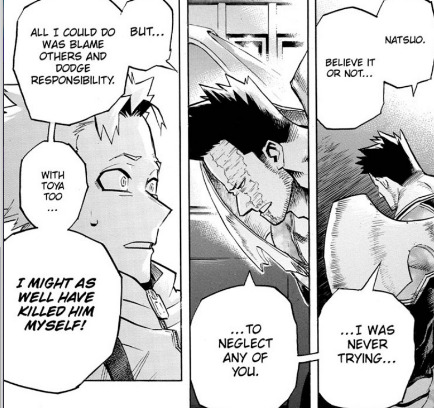
Or rather. Look at hos he frames Toya’s funeral portrait a “Mistake.” He also repeats the same thing when he tries to talk to Natsuo. He says that he was never trying to neglect any of them. Which is, you know, a blatant lie if there ever was one. Toya calls himself a failure, because Enji literally referred to him and his brother and sister as a failure. We’re shown the flashback where he was kept away from his brother and sisters multiple times. He literally chose to treat three of his children like they didn’t exist, and not even let the youngest talk to them and he can’t own up to the fact afterwards.

And, this once again ties back to personal narrative. Enji believes, and this has been the problem with him since the Pro Hero Arc that his true problem is that he wasn’t a good enough hero. A lot of people didn’t like the sudden inclusion of Enji’s backstory, but it makes sense to some extent, Enji’s regret is his father wasn’t strong enough to protect an innocent girl from a villain and died when he was young, therefore becoming the strongest hero makes it so he can never die and abandon his family the way his father did. Except. He does abandon his family.
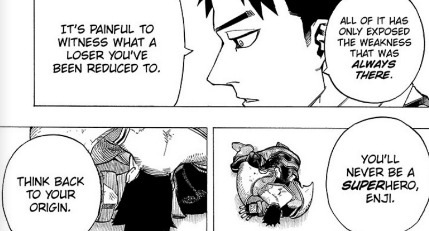
Enji can’t face what he has done wrong, because of his self-justification. He is a hero, and therefore he always has good intentions, and he can’t be the villain even when his own actions would make him one. Enji is on such an insane level of sunk cost fallacy, that in his mind, after the death of one son continuing to abuse another son is justifiable because otherwise he quite literally let one son die for nothing.
And, it’s this refusal to even face the fact that he can be wrong, which is why Enji ignores the feelings of everyone around him, and generally lets things fall into ruin. All Enji had to do was show up on that hill the day Toya burned to death, but something so small as lifting a finger is just impossible to Enji who cannot confront his own flaws, or even think of himself as the bad guy in any way.
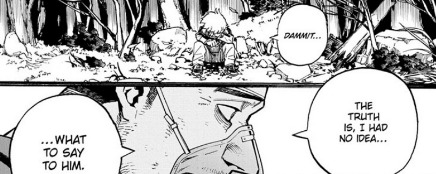
Which is where we get a common trend between both Hawks and Endeavor, in which, they do not want to face the feelings or even the memories of their victims. In the Todofam dinner arc Enji tells the funeral portrait of Toya he wants him to come home and have dinner, but when he has the oppurtunity for that he won’t even face him and talk to him. Toya is just so much more convenient to face when he is a regretful memory, a mistake on Enji’s part, because then Enji is completely in control of the narrative. He barely thinks of Toya at all, and when he does it’s almost entirely on his own terms.
Toya even comments on this, that he was always running and crying to Natsuo and Enji didn’t even know because he didn’t care to know. We have this same behavior repeated in Hawks. Hawks is really only comfortable seeing himself as the good guy.

@thyandrawrites wrote two meta in regards to Hawks I want to reference now. This one on how Hawks thinks he has to continually justify his existence by acting as a support and helping others, and this one how Hawks in turn dodges responsibility when it comes to light he’s not the good guy.
Hawks is someone a lot more complicated than Enji, because he’s not selfish, and he doesn’t really hurt others for self-gain. If Enji is a black hole, then Hawks is more like a sattelite. He does everything, including dirtying his own hands for the sake of others, and a greater good he likes to believe he is serving rather than for himself. In fact, it often comes at expense of himself, as Hawks has no real life, or friends or place in the world outside of being a hero.
While he is different in intention than Enji, however, I believe it’s still right to call him out on basically everything he does to avoid guilt after the fact. “Doing dirty things for the sake of the greater good” is one thing, but Hawks in total denial of his actions can’t even see himself as dirty. Which once again we return to personal narrative, Hawks’ personal narrative and his self perception trumps everything, even the feelings of other people he is stomping on.
To quote Thy on this:
So this brings us to the present arc. Right after a raid that failed largely because Hawks wasn’t able to warn the heroes of the threat they were about to face, Hawks reacts by shutting down. If his existence is defined by how helpful he is, it goes without saying that he cannot accept being responsible for the huge death toll resulting from the failed ambush. So we witness Hawks not thinking critically at all about his share of responsibilities. He doesn’t think about what it meant to kill Twice.
This was the post-apocalyptic scenario that Hawks envisioned and wanted to avoid, the scenario he killed Twice in order to avoid. But it still happened, and yet we don’t see him reflect on it at all. What he does instead is clinging to something that gave him a sense of purpose before.
Being a tool instrumental to other people’s success.
Which in a way means that the same character stagnation that is present in Endeavor is there for Hawks as well. He has not changed in any significant way since his introduction in the Pro Hero Arc, effectively holding the same beliefs and making the same decisions as he did back then. That he needs to uplift Enji as a hero, and his own personal hero, even after learning the truth of who Enji was.
And, we have this same guilt-avoidance mechanism that is at the root of Hawks’ stagnation the same way it is with Enji’s. Hawks practically does the same thing that Enji does to Toya with Twice, despite literally murdering him with his own hands, instead of taking responsibility for his own actions, or even I don’t know... at the bare minimum... feeling sorry about it, he chooses to remember Twice as an idealized memory, compartmented into a neat little box in a way that’s very flattering to Twice.
It’s not “I killed Twice and I regret it” it’s “I want to learn from Twice and be helpful just like he was.”
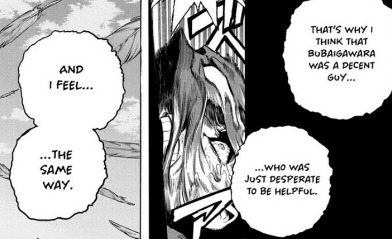
In doing so he belittles and ignores not only Twice’s feelings, but also his entire memory. Hawks and Enji both kind of want to believe their own internal narration that deep down they are good people, and their intentions and actions are those of a good person, and therefore everything they might have done wrong along the way is just a mistake or a slip-up on the road. Hawks always returns to the memory of him selflessly helping the people on the bus, because he wasnts to believe who he is at heart, but that’s also not how he is.
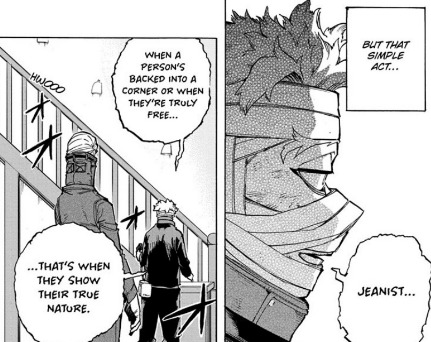
They have no identity outside of being heroes, and yes it’s tragic to think they would crumple if ever faced with or trying to process the feelings they outright ignore, and also doubly tragic in Hawks case that he was groomed to feel that way by hero society at large from a young age, I also think it’s important to look at the cost of their actions. Hawks and Enji actively harm people, and get away with it with a slap on the wrist, and because of that they don’t reflect or change on their actions and they continue their bad behavior.
It’s important to remember in Toya’s backstory, if Enji had just stopped and given up on his abuse of Shoto after Toya died, then Dabi would never have come about, and Toya would have come home. It’s this subtle escalation that happens when Enji is not confronted about his actions, and even enabled by the people around him to keep doing his bad behavior, it gets worse and worse over time.
The whole point of the Todoroki household is that it didn’t have to get as bad as it did, but it happened because no one tried to stop Enji, and Enji was so good at self-justification he didn’t try to stop. Which is why I want to point out, it’s not just harmful for Hawks himself, it doesn’t just stunt his growth as a person, it’s extremely harmful to the people around him, because he cannot admit his mistakes and he cannot grow for them and so therefore inevitably he will repeat them again. In fact Hawks has gotten worse in some ways, which is where I want to reference Thy again.
Hawks even outright plays the victim. He’s not doing a public apology through a press conference because his personal ethics tells him it’s the right thing to do. He’s doing it because he knows it’s expected of him, which just isn’t the mindframe of someone who understood the gravity of his actions. From his phrasing, we can parse that he thinks that heroes like the top three are being put under scrutiny for no good reason, and like this is a test of his own endurance, when it should be a matter of proving his good faith. Hawks just killed a man who was running away, and he’s acting like it’s unfair that the world is holding him accountable for it.
The reason why Hawks thinks that society turned on him is because he justified Twice’s extrajudicial killing to himself as something he was doing to protect that same society that is now ungrateful for his personal sacrifice.
Hawks own motive of doing everything for the greater public good has been corrupted, because his killing of Twice did not give him the validation he was seeking. Which reveals once again, Hawks is not entirely selfless, just like a person he wants validation, he wants encouragement, he doesn’t do everything for the sake of the greater good. If he really believed his own personal narrative that he can sacrifice himself and others for the greater good and get his hands dirty and it will all be justified in the end, he wouldn’t be pouting because people criticized him.
There’s a certain fragility to the ego of both Hawks and Endeavor where they can’t really accept any outsiders perspective on their actions at all, because everything has to be in line with their narrative, their own personal hero stories.
Everyone talks about the differences between Nagant and Hawks, but there is one new angle I would like to bring in. Perspective.
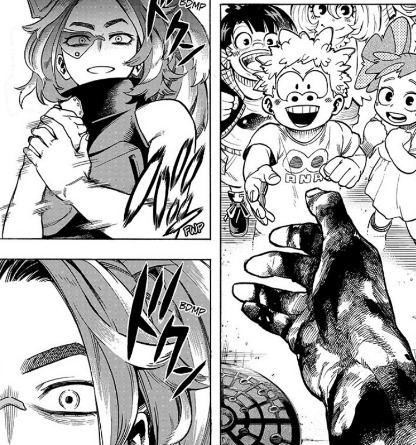
In the end what stopped Nagant from blindly following orders was her seeing her own self as dirty, after doing the dirty works of others. Nagant accepted the guilt of murder, and realized in comparison to the ideal way that the kids she was signing autographs for her saw her, she wasn’t living up to the hero they saw.
Nagant was able to divorce herself from her own self image, and because of that she actually changed and took action against the corruption of the hero’s council. Lad Nagant if anything is capable of change in a way that Hawks isn’t, because Hawks can’t perceive any fault in his own self.
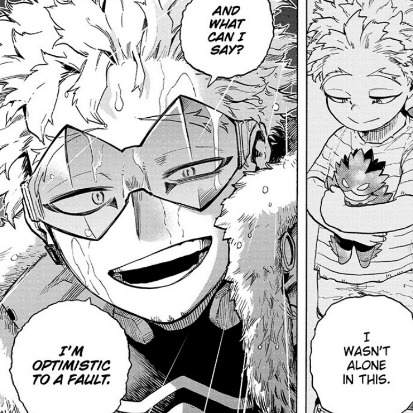
“I am optimistic to a fault.” almost quite literally in this case. When he is confronted with the reality of who Endeavor is he prefers to choose the image of a hero he saw as a child, and on the way he actively enables Endeavor to keep doing wrong by his abuse victims. Of course he says Endeavor is living to atone, but Hawks essentially advocates for doing what is worst to Toya which is ignoring Toya entirely, and on top of that making Shoto fight against him for Enji’s convenience.

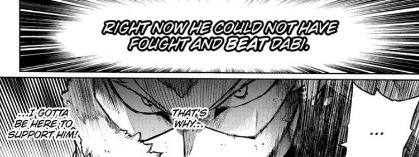
He remembers Twice in a positive light as someone who was helpful and wants to be like him, but when faced with a Twice who returned from the dead just wants to murder him again. Nagant says, the public gets to stargaze at the bright and shiny side, while the dark truth gnaws away from someone else.

And this, I think is key to understanding why Hawks mental spiral is so harmful because it doesn’t just harm himself, other people are always going to get hurt too so Hawks can maintain his fragile ego and sense of self. Hawks may be a brave hero able to courageously risk his life but at the same time he is an emotional coward, he cannot face himself or his own emotions or even when he does something wrong simply because he is too scared to.
And, yes the villains do this too but they at least at the bare minimum do not think they are good people.
#mha meta#my hero academia meta#my hero academia theory#enji todoroki#endeavor#takami keigo#hawks#jin bubaigawara#twice#toya todoroki#dabi#bnha 374#bnha 374 spoilers
460 notes
·
View notes
Note
Was anyone else incredibly disappointed by The Stolen Heir
Holly Black focuses more on the ongoing revelations of her characters which pays off after the story ends. In TCP, everything was thrown out of proportion since we view their world through Jude's perspective, which makes little sense for us. But after TQON finished, certain dialogues have been perfectly engineered with the characters intentions.
The political fantasy is what keeps the story moving, further revealing how charcters tend to act then react. It's multi-faceted but also confusing, rather than a direct confrontation style that authors would rather use. Holly Black also writes in explanations, rather than descriptions. This could be on Jude's reason why she doesn't feel empathy about Cardan's childhood abuse, or the perception about other people's actions and her immediate and quick presumptions about it.
In TSH, we don't get the bigger picture of Oak's background. Which is a genius maneuvering technique to keep their story fresh and alive.
Readers would feel frustrated of how the events played out. But Holly Black is in the long game, it takes patience and a lot of re-reading to fully grasp the intensity of the character's viewpoint of what they think is happening vs. What is actually happening. That is why most TFOTA fans really love to re-read her books.
#tfota#jude duarte#the cruel prince#the wicked king#jurdan#jude x cardan#cardan greenbriar#holly black#the queen of nothing#cardude
74 notes
·
View notes
Text
The Pathologic Russian and English analysis: Artemy Burakh the Haruspex.
On this episode of “I am definitely not okay and dedicate my time to sillygoofy things” - we look at the Haruspex in the Bachelor's campaign. This alone took me a whole month, because there is a lot of funk happening in my life, so the Changeling will have to wait a little more. Anyway. Y’all maybe don’t know the drill quite yet, so let’s start at the beginning.
What is the Haruspex like in the English version? Well, discarding the “sweet but tired dad” persona that the entire fandom has assigned the poor guy, the impression I got while watching people playing through the game is that he is first and foremost a very impulsive person, and that, in a way, carries over to his speech. He’s also very cryptic to the other healers, in that ominous “you shouldn’t have done that” way. If I hadn’t read at least a bit of his dialogue lines for the previous analysis, I would have assumed that he’d be the one to use all those “rough” words every other sentence, since that’s how people from outside of the capital cities are usually portrayed. In the Bachelor’s campaign, he is almost like a goddamn cryptid, that tells you he doesn’t know what antibodies are and then presents you with a panacea on the very next day - he speaks very little and does not bother with niceties besides the honorary title. In the Changeling campaign, all those factors seem to be even more emphasised. Overall he acts even more distant, even more ominous and is even more threatening, since it’s seen through the eyes of a scared little girl (she’s also a miracle worker but we won’t talk about it now). Both of the campaigns are, of course, drastically different from what we have in the Haruspex campaign - which is where we get to see the whole “guided by the heart” thing in action. From the other two’s perspective, he is an ominous, potentially volatile, but still helpful figure. And his speech matches that exactly. So let’s get cracking.
As the Bachelor: the vibes are pretty consistent between the English and Russian version. The Haruspex is just as cryptic and curt in both of them, and doesn’t talk in the manner usually given to all these “rough and dangerous” types in Russian fiction. In all honesty, I think it’s the fact that his manner of speech is so simple and short that made translating it to English so much easier (or at least I think it was). Sadly, there is so little dialogue, that it also meant I barely get to talk about anything interesting, since what little there is to look at, is mostly accurate. But, when there ARE differences… Oh boy are those differences. So, you’ll see a little bit of other characters in this analysis as well because these interactions in the Bachelor campaign felt almost like an afterthought. Like, the writers knew how the wanted them to meet and part, so in the middle, they just used Burakh to be a tool for exposition, and not much else. Additionally, the “fairytale-like” way of speech that Artemy has in his own campaign seems to be gone here, and I can’t wait to see what happens to it with the Changeling. With all that being said, here is the more fun stuff: aka the snippets and screenshots! Once again, the chronological order is dubious at best, and most of this was written at two am in the morning, so I hope this isn’t completely insane.

Very interesting choices made in the translation here. First and foremost - instead of relying on his heart to guide him, the Haruspex specifically says that he is guided by “his love” which, depending on how consistent this change is, might strengthen the connection between several different themes. Now to the fun part - “it’s a shame we aren’t standing together.” I need you people to understand that I am trying to remain as impartial as possible when I write these, without inserting my own opinions of the story or anything. But, the much more word-for-word translation of that line would be “Pity, that we aren’t together.” And yes, people being “together” does also have the same connotation in Russian as it does in English. And while I understand that it’s mostly likely supposed to imply “allyship,” I think it could be worded a lot better, had the writers wanted to avoid misunderstandings.

Let’s focus on the last sentence here: in English, the Haruspex says he admires Rubin’s determination to help people. In the original version however, the sentence is “He deserves respect.” See, the interesting thing here is the difference between “I” and “everyone.” Where in the English version Burakh voices his personal approval of Rubin, in Russian it’s an unspecified, but general statement, which bears the implications that others should respect him as well. And while the difference itself isn’t too significant on its own, when paired with the fact that Rubin is someone who’s on the run from half of the town, it hits a bit different.
Also, and I didn’t really know where to stick this, and maybe this could’ve waited until we actually got to Rubin as a character, but yeah. I wanted to point out specifically that the word “master” in Russian doesn’t have a dual meaning. Cuz, correct me if I’m wrong, in English this can both refer to a master of a certain activity (ie martial arts master) as well as a proprietor of something (ie master of the house). In Russian, however, the word “master” refers exclusively to a “master of their craft” type of people. A master of a property is referred to as an “owner”. The “Mistresses” in Pathologic are also referred to as “owners” (with a suffix that indicates female). This creates a bit of a confusion, because the word exists in both of the languages, but only shares some of the meanings. And uh… This is related to this quote because uh… Something-something recognition of expertise.

I’m personally a big fan of the themes of freedom, and how different people react to losing their freedom of choice, or dealing with the information that they were never free to choose to begin with. And that brings us to this little line, which I find particularly interesting. In the original Russian dialogue, Burakh says that he had already “lost” his freedom, in the way one loses something in a game. I feel this shines a different light on both how he eventually reacts to being told that he’s just a toy in a child’s game (he’s had to deal with disempowerment this whole time, it’s nothing new to him) but also with how he views his loss of freedom. Not something that some higher power has revoked from him, but rather something that he himselfs basically “gambled away.” In that sense, I can see the eventual reveal that everyone is simply a toy in a sandbox being a relief. In the way that it wasn’t his fault after all, that everything was predetermined, and that he couldn’t have carelessly lost something he didn’t have in the first place. Makes me wonder what the dialogue between these two would’ve been like if they’d met on the first day in this campaign.

I have a shamefully small amount of notes as I go through these, so I’m literally latching on to anything to talk about. I pointed out how dry and laconic the Haruspex is, but god DAMN if that doesn’t make for text that’s easy to translate - and that gives me less things to work with. For example this - a simple word difference in the last sentence that you couldn’t possibly translate properly without sounding illiterate. Because as it is - the translation is accurate in the last sentence. But that’s because “evil” in English is both a noun and an adjective. In Russian, however, the adjective for “evil” also makes for a synonym to “angry” and that doesn’t fit with the meaning conveyed here. Burakh calls Clara “evil itself” the embodiment of evil, all that shabang. It’s something that is recurrent in people talking about her, from what I’ve seen - people address her as a concept, and link her to more generalised ideas, rather than specific characteristics. Either way, it’s a fun thing to think about.

Hi, confused, I’m dad. I did a thing where I tried to read the English dialogue in its entirety first, because I wanted to avoid talking about information that was already accessible in English, and I remember being confused at this line, because… The cattle grounds were on the other side of the Gorkhon? Since when???? It didn’t make sense with the rest of the dialogue either, and the Russian version says “on this side of the Gorkhon” so… What gives? Assuming that the website is accurate (cuz if not, then I’d have to go and check in the actual game which would take hours to get to) does this then just mean it was a simple translation error? Or did the writers decide to change the lore as they were translating? It confuses me so much, because overall the game is well translated, so I don’t get how no one noticed that the meaning of the sentence becomes completely flipped here. Anyways, if you’re like me and that confused the hell out of you in English, just know that it makes sense in Russian and you can sleep soundly. Also, on the more chill note, there is no reference to a kraken in the Russian version, the deposits are compared to octopus tendrils.

I know this isn’t Bachelor time again, but I wanted to point out that there’s a switch back to the formal “you” here, and I feel like it throws a wrench into my previous theory. Or maybe it supports it. Let’s try to be objective here. The simplest explanation could be simply that this is a continuity break, that this was completely unintentional from the writers, and that I am trying to figure out why the curtains are blue in a situation where they are, indeed, just blue. But we like fun here, so let’s assume the curtains are blue for a reason. The real problem is whether this works with my previously established theory, or if it's for a completely different reason.
If we are going with the supposition that the Bachelor switches to formal “you” when he is uncomfortable (which some people found strange when I brought it up, but it’s a legit thing in Russian. Like, I do that sometimes when I want to place a little bit of professional distance between myself and whoever I’m speaking to, though sometimes the person might get upset if you do that) then one possible explanation would be that he is uncomfortable with the implications that this new knowledge has brought to light - a huge residential part of the town is sorta kinda maybe doomed. It could also be the overall dread of what the other piece of news would be.
On the opposing side of this argument is a somewhat mundane explanation that would bypass my theory completely. The idea that the switch to a more formal language was either an attempt to keep the conversation civil and “professional” at a spot where a conflict of interests could potentially emerge, or the possibility that it simply happened because sometimes a person doesn’t know where they stand, or what would be more appropriate in this situation, and opt for the safe formal version.
I do want to apologise, in case y’all don’t wanna hear these hypotheses of mine, I just thought it would be unfair to pretend like my explanations are the only ones out there, so yeah.

Welcome back to “mom pick me up, the translations are being weird again” this time - "my confidants are alive. Are you sure they’re alive? I see no problems." Perfect, flawless logic, I love. And while I understand that the original Russian version uses a very “ye olde” version of “if,” I still assume that the translating team spoke Russian and understood the meaning of the sentence. For context - the modern version of “if” in Russian is “если” (yesli). However, in this line, the Haruspex uses an older word “коль” (kol’), which implies a condition, or an “if” scenario. But the word itself isn’t extinct, people still understand what it implies, the same way native English speakers would know that “thou” means “you.” Like, I can’t imagine how the meaning got flipped in here, it just confuses me. Either way, the “I see no problems with that” is also kinda wonky, because it makes it sound like Burakh has no problem with the “my bound are alive - so I’ll be at the meeting” logic. In Russian, he specifically says “-I’ll come. I see no obstacles.” As in - there is nothing to stop me from doing so. Anyway, translation wonky, let’s see how the rest of it goes.

Now that’s an interesting difference. And a morbid one at that. This is the line where the Haruspex talks about his bound “rebuilding the settlement and turning their lives to become the angels of its foundation.” Which I interpreted more in the sense of - becoming the highly revered figures of the town, with lots of authority and responsibility - like angels. And I’m curious to see how y’all interpreted this, because I did not anticipate the Russian version in the slightest. And it’s this: “... my bound, that are destined to bring this town back to life and lay down their lives under its new cornerstones.” For one, I find it curious that both in English and Russian there is such a similar turn of phrase - because “lay down their lives” could have been translated almost word for word. But also… I am so confused. Is the sacrifice in this sense a literal one? Or does he simply mean a dedication to the town so strong that it could count as giving up one’s life? Either way, this is definitely a curious difference in translation, and I’m not sure what to make of it.

The interesting thing is… For the most part the “Are you aware that we turned out to be toys” dialogue starts the same in both the Haruspex and the Bachelor runs, only diverging in a few character-specific moments. This is one of them and… I don’t even know where to begin with this bit of dialogue, and not because it’s bad. I think it’s translated well, but there are about a hundred tiny little differences that change the vibe a little to the left, make some phrases more bitter and others more candid. For one the whole “take a closer look” in Russian is a direct invitation to compare the two healers, not an implied one. Secondly, instead of not being “a toy to keep” Burakh says that he (in a literal translation) “isn’t to be pitied.” But because Russian is a funky language, what this phrase actually means is - he doesn’t see himself as worth being concerned over, someone who, if sacrificed or given up, wouldn’t be seen as that big of a loss by others. Someone who others would readily discard, without feeling guilt, pity or sorrow. And I have big feelings about that. Additionally, the line about the Bachelor being “an entirely different thing” is kinda funny to me, because it’s a pretty long sentence in English, but in Russian it’s just… Four words, two of which are only two letters long. It definitely carries a different vibe, simply because of how laconic it is, it comes across as much more of an exclamation. In the closest to a literal translation while still remaining coherent, he says “You’re a different case!” which in turn conveys the vibe of “But look at you!” and while I think the translation does a great job at communicating both of them, they also lose the abruptness of the exclamation, which I think adds to the line.
Still not Bachelor hours anymore, but I wanted to point out that the “You’re having fun… Somehow I fail to join in” is a line that sounds sombre and distant, but the Russian version is “You’re laughing… But I don’t find this funny at all” and it has the wording of a child entering their “sulking mode” because someone made a lighthearted joke that they don’t get. Ok, maybe not that extreme, but there’s definitely a lot of bitterness to it, because the idea of being dolls clearly affects the Bachelor very heavily, and then he sees the Haruspex just being like “yeah we might be dolls. So what? You only care cuz you’re made of better materials anyway, lol.” And I imagine that’s pretty hurtful.

Reading this in English, I could practically feel the “there was supposed to be an idiom here, but it’s one of the ridiculous ones, so we had to translate the meaning instead” coming from this line - particularly the “not a single weak spot anywhere” part. And sure enough, the original Russian version says “...everything was done cleanly - a mosquito won’t sharpen its nose” (the nose, obviously being the proboscis). And while I am a big fan of Russian idioms, and was a proud owner of not one, not two, but three books on them as a kid, I’ve never actually heard of this one. The phrase itself means a job perfectly and flawlessly done, to the point where it can’t be improved upon. The leading interpretation to its origin is the idea that a mosquito’s proboscis is a perfect tool for its purpose - long enough to reach blood and thin enough that a person usually doesn’t even feel a mosquito bite until it’s too late. A mosquito’s “nose” could not be any thinner or sharper - therefore a mosquito won’t sharpen its nose.

God, how is it that in the series of dialogues that are the most dry and direct, in the few places where discrepancies are present, the discrepancies are the most confounding and meaning-altering ones? This is still from the dialogue in which the Haruspex and the Bachelor discuss Aglaya on the final day, and the choices in the translation are kind of confusing to me. The original line is “As far as I understand, in the orders given to her, the Powers That Be have concealed (or kept from her) the fact that they want to save the town specifically alongside the Polyhedron.” And while you can still get that implication from the surrounding dialogue, with the whole talk of “she would’ve caught on to the scent of foul play,” it’s still weird that this line was translated so differently. Because as it is, it creates the feeling that it was more of a “technicality” scenario. You know the trope: “I never said anything about so and so, therefore this little inconsistency is going to screw you over, should’ve read the fine print” etc. Almost gives this dialogue a sense of snark, while it’s the exact opposite. The English version weighs in more on the Powers That Be being cold and inconsiderate, while the Russian version is specifically aimed towards emphasising the idea that Aglaya is not to blame. You know. What this whole dialogue is about - Burakh “painting Aglaya as the victim.”
And that’s about all I’ve got for the Haruspex from the Bachelor’s point of view. There are a few things here that shine a new light on some of the themes, or specifically the relationship between Burakh and his sense of fate and control. The overall theme that there is always something higher up that is either in charge or to blame for the things happening, and that Artemy usually takes on as much responsibility as possible because there are only a few things that are truly up to him. Like, that’s why he doesn’t blame Aglaya for her spite or deception, and why he isn’t hostile to the Bachelor in this run - he sees both of them become disillusioned and spiteful, when they find out that all the decisions have been made for them. But as someone who’s never felt much freedom, from responsibilities and choices made and imposed on him by his father, to him being able to see the Lines and where they lead, he’s had to learn to be grateful and accepting of the little choices that he is allowed to make.
And while these closing remarks aren’t exactly exclusive to the Russian version, it just makes me understand the Haruspex ending better. Like, it took me a while to figure out why he’s the character who’s seen as the one “capable of being actually free” or whatever it is that the devs say to Clara (you). It’s because everyone else who is aware of their nature (except Clara, maybe, I’m not sure yet) is someone to whom this is a disheartening and devastating revelation - they become blinded with this knowledge and end up “acting out” exactly the way they were supposed to. Aglaya doesn’t manage to disobey or defy the Powers That Be, nor does Daniil. Yulia too - though she doesn’t know this is all a children’s game, her theory about the “tripwires of fate” is what ultimately traps her in the path chosen for her. The Haruspex on the other hand, not only had to grow up with the idea that he’s fated to become the Warden - serving the purpose of the Kin, but quite literally could see the way things are predetermined. The fact that they’re all dolls, to him, is just a different way of seeing the Lines. So it makes sense that the best ending in the Haruspex run isn't the Termite ending, but the ending of any of the other healers - because then he actually makes a choice. Exercises the little bit of freedom that he has. It's a very interesting progression, where as the Bachelor you , the player, can claim responsibility for his choices, as the Haruspex you can make a choice despite the game's predetermined nature, and then as Clara you get to do both. Throughout these campaigns, you are gradually gaining freedom from the constrictions of the game.
Either way, who knows how long it will be until Clara's point of view on the Haruspex, I certainly don't. But if there is any feedback or stuff, I'm always open to hearing it.
#pathologic#pathologic classic hd#мор утопия#ramblings#artemy burakh#daniil dankovsky#the document is now 17 pages long oh boy oh wow
180 notes
·
View notes
Text
…Welp. Surprise Bad Opinion time I guess :P
Personally, even after ep 6 I still kinda genuinely want at least part of the Solver/Cyn-as-we-know-her’s actions to be actually Cyn, or at least some distorted version of her?
Like, I know Tessa’s dialogue implied more that Cyn was just a puppet of something else + the whole “something made a pact with her” that’s definitely gonna come back later, but like also
tbh in a series with so many good examples of characters driven to terrible actions by their convictions, be it Doll putting vengeance above all else before realizing someone else was infected, Khan getting so lost in his fear he abandoned his own daughter and is still trying to be better, V just trying to put her head down embrace her role and survive while protecting N but only hurting him in the process until Uzi started forcing her to confront it by helping N- hell, even Uzi herself has shades of this in wanting to destroy humanity without really even considering maybe not all of humanity in general is personally responsible for every single bad? Not counting Camp Incident, that was more outside influence induced rampage
Not to disrespect anyone who has another opinion- I think there’s very good options with the other way around too, but like to say it’s just the Solver alone that made Cyn like that, and the Solver is some malicious entity directly responsible for making Cyn the monster she became. Feels kinda boring to me? (Not that I think the Solver’s SAFE mind you- it definitely gives off at the very least major “has side effects of Needs To Kill To Live + does not care what is done with its power beyond that good or bad/blue and orange morality + if the host is at risk it will hijack the host to preserve itself and *only/mainly itself*” vibes)- I feel like there’s a lot of potential in the perspective of like.
What if Cyn’s like an Uzi that gave up on humans and her fellow workers alike, once had that ideal of wanting to change the world only to have it fall into bitterness, then suddenly had all the power in the world to act on it dropped into her lap?
What if Cyn’s a foil to Uzi- an Uzi that got the power to fully destroy humans and DDs and everyone who ever bullied her but wasn’t able to take a step back and find something to care about outside that rage like she did with N in canon?
What if Cyn’s what Uzi could become- if not metaphorically, then literally
Also, NGL Tessa’s not exactly a 100% solid source in my eyes- like. I think she’s telling most of the truth but there’s definitely something deeper going on-
#murder drones#murder drones headcanon#murder drones cyn#cyn murder drones#TLDR *gets in a clown car labelled ‘dumb opinion not technically Disproven by canon yet* Later Nerds!! *crashes headlong into a brick wall*#(also to the one person who tagged this ‘glad to see we all agree’- I see you#and you have unintentionally added the funniest most ironic tag you possibly could’ve#congratulations I the local jester in disguise salute you)
112 notes
·
View notes
Text
This post got me thinking about plagiarism as applicable to fandom works, and how like many other things that used to be topics of common discussion and common understanding in fandom, no longer are. Got me thinking that perhaps a touchstone on the topic would not go amiss.
Obligatory disclaimers: I am not an IP lawyer, nor a BNF, nor any kind of authority on matters; I am only familiar with copyright and IP conventions in the United States; and I am speaking from the perspective of "I was present for the discussions that hashed this out in excruciating detail in the _journal days, and this was my takeaway from those discussions."
WHAT PLAGIARISM IS:
1) The direct copying of actual text, that is to say the exact same words in the exact same order, from a source text, republished in an independent context without permission or acknowledgement that the text is copied, without acknowledging the original author, or by claiming to be the original author.
2) A dick move.
3) Grounds for specific retaliatory actions in specific communities, i.e., an academic setting or an archive, which may choose to reject a plagiarized work or expel a member of the community found to have done it.
WHAT PLAGIARISM IS NOT:
1) Illegal, in the sense of being punishable by legal action.
2) Using some of the same words, in sort of similar order to the original text.
3) Using the same title as a different text.
4) Using the same story setup as a different text.
5) Using the same characters, settings, plot elements, or narrative arcs as another text.
6) Translating a text into another language.
7) Reading, saving a copy of a work to your hard drive for re-reading, printing a copy for hardcopy reading, etc.
8) Copying out sections of a text in a comment, or as an excerpt to accompany a work in a promotional post.
9) Using a work as reference material.
10) The only kind of dick move there is.
Thousands of hours of round and round debate boil down to this: You cannot own an idea, but you can own the actual words that you write, and you own those words by default, without needing to take any specific actions to that end. (Proving that you own the words is something that you might, under some circumstances, need to take action to do, but really only if someone else tries to stick their oar in to claim ownership for some reason, which is one of the reasons why plagiarism is A Dick Move: forcing people to defend ownership when they shouldn't have to is inconveniencing and unpleasant.)
Even then, there's a fair amount of wiggle room on the topic of Actual Text which falls under fair use. For instance, if you reference a line or several lines of canon dialogue from a book because you are retelling the scene from a different perspective, that is generally considered fair use, but copying the actual text of the entire scene would not be. By the same token if you had a line referencing canon dialogue in your fic, and another person references the same line of dialogue in their own fic, the other person is not plagiarizing you. And if two people in completely separate fandoms reference the same Hozier lyric as a title for their separate fics, that is not plagiarism either.
I also said that plagiarism is not illegal, because strictly speaking it's not. It's an extremely rude thing to do, but it doesn't become illegal in the sense of being punishable by legal action until a lot of other factors start coming into play, most of them having to do with money. At which point the objectionable action is usually not described as "plagiarism" but as "copyright infringement" or other more legally granular terms. (You'll note that I said up above that you cannot own an idea; whether you can own a specific implementation of a character or a setting is another matter, and where IP law starts getting really into the weeds. But this post is only about plagiarism, not copyright infringement.)
Generally speaking, you can't get the law on your side unless you can pose a reasonable argument that the other person's actions have harmed you in some way, including some financial way. This last distinction is the primary reason why fandom creativity has stuck out as long as it has despite our society's (historically speaking) very restrictive IP laws; IP holders are not losing money to sales if fanfic authors are not selling, and they are not losing reputation or recognition if the fanwork is not seeing wide reach.
WHAT ABOUT AI?
That said, there's an awful lot of breadth between what is considered outright illegal and what is considered a really rude thing to do which may start seeing social penalties accrued. Which is why scraping someone else's Actual Text and doing something like feeding it into an AI bot without their consent is an incredibly rude and unpleasant thing to do, even if it does not fall under the definition of Literal Plagiarism, and if a person does this a lot and word gets out about it, that person may find themselves very unwelcome in the community.
#long post#the post earlier about how just because something is not Illegal#doesn't mean it's not a dick move#made me think about this again
45 notes
·
View notes
Note
hello! regarding the post about writing mlm or wlw scenes and pronoun usage, i wanted to ask if you'd be able to clarify anything for characters who use they/them pronouns or multiple sets of pronouns, like she/they or he/they.
in my head, i feel that it may be necessary for the narration to include one set of pronouns to avoid confusion, while the characters in dialogue refer to the character with multiple pronouns with either or. that's just my thought though, and i wanted to ask for your insight.
thank you in advance!
This one you're going to need to wrap your head around. Who is the POV character, the person with multiple pronouns or someone else? How is your story told (first person, third, etc)? When do pronouns come up, and how does the person they belong to feel about them?
One example I could use is someone who presents very feminine but personally prefers to lean toward 'they' most of the time. The option of 'she/they' may be something they lean into to make others more comfortable (when dealing with clients they won't know well, in social situations, etc). If the story is from their perspective, they could explain this in the narrative - the same goes for if they're a friend of the main character. If they're a minor character, a quick "I'm okay with both" to explain a name tag or introduce themselves is probably your best bet.
If you have a character who is neutral on both or prefers to switch, you'll have to make the decision depending on their importance to the story - if their the main character, noting that switch in the text ("I prefer he today") will help orientate your reader. When in doubt, spell it out, and you can clean it up in post.
Your biggest concern is clarity (though again, don't sweat too much on the first draft). I've seen this done poorly by people I know meant well, but keep in mind that your audience needs a little guidance. You always want to make it clear who is talking - feel free to stick with names in dialogue tags, with pronouns used to describe actions. If your character switches pronoun use in the middle of a scene or chapter, it's better to highlight that switch, especially if you have other characters in the scene. You can also rely on context clues (changing clothes or settings, how they feel in the moment) to highlight why your character is using a particular pronoun.
Third, consider your audience. Are you writing for your fellows who won't blink an eye? Don't sweat it so much. Do you anticipate a larger cis audience who might be very new to the idea? Give them (and yourself) some grace in making sure it's clear who the character is no matter what pronoun they use.
(Check out sci fi and fantasy books with multiple pronoun usage, by the way. You'll find a lot of great examples to study!)
43 notes
·
View notes